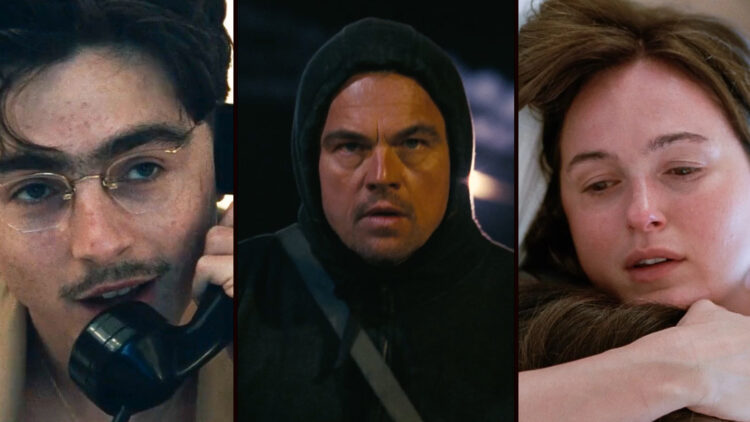
With the summer movie season now quietly winding down, fall is upon us. As we do each year, after highlighting the best films offered thus far, we’ve set out to provide an overview of the titles that should be on your radar.
Featuring 50 films, the preview includes both the best we’ve already seen (with full reviews where available) and the anticipated with (mostly) confirmed release dates over the next four months. A good amount will premiere these next few weeks at Telluride, Venice, TIFF, and NYFF, so check back for our reviews. Dates below are theatrical releases unless otherwise noted.
Explore below and check back soon for our most-anticipated films premiering at fall festivals that either don’t have a fall release date confirmed or U.S. distribution.
Twinless (James Sweeney; Sept. 5)
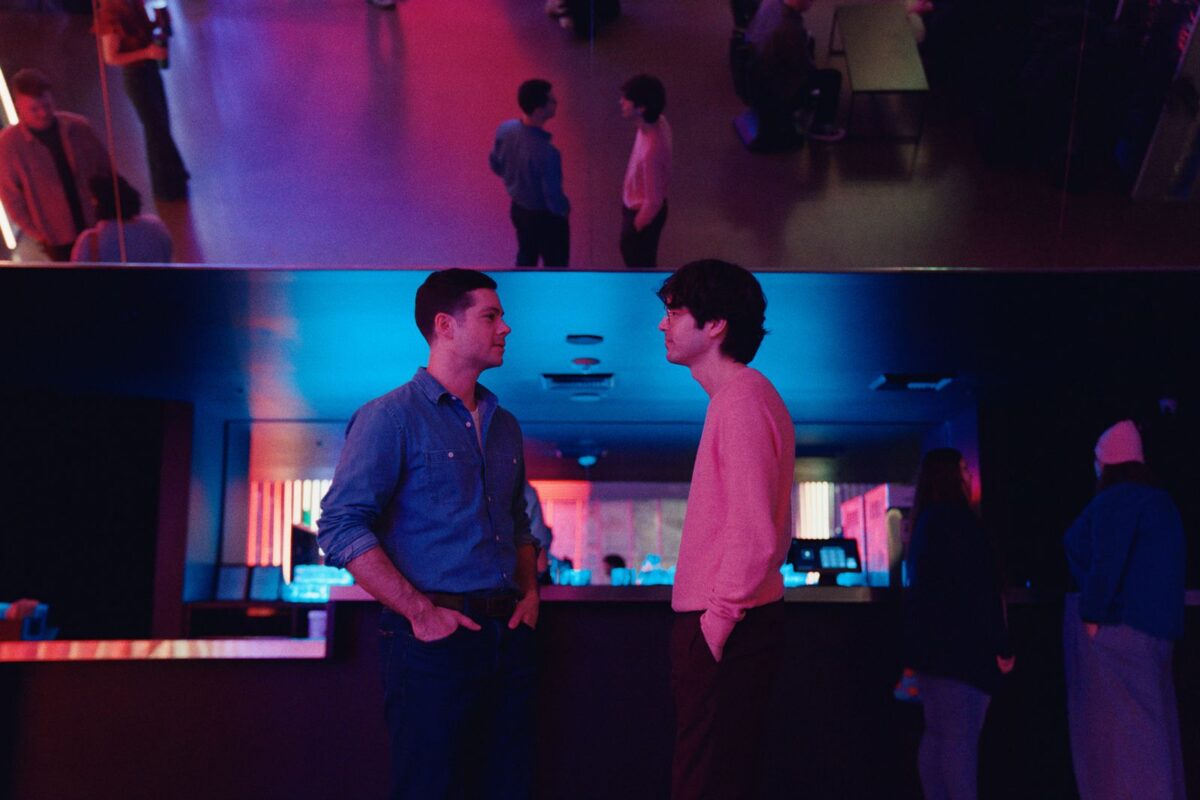
Twinless starts like a prototypical Sundance movie––grim and serious, plus unexpected levity. That’s the general formula for a festival that might as well have manufactured the term “dramedy.” In this case there’s an offscreen car accident and quick cut to a funeral. Roman (Dylan O’Brien) stands grieving beside his mother (Lauren Graham) as the casket containing his gay identical twin brother, Rocky, is lowered into the ground. It’s a somber affair––tears, tissues, a violinist’s rendition of “Danny Boy”––until the song pauses abruptly on a false note, engendering awkward silence. It’s the first permission you have to laugh, then to recognize the faint absurdity of a gathering in which mourners approach Roman and bawl at his uncanny likeness to the deceased. – Jake K-S. (full review)
The Baltimorons (Jay Duplass; Sept. 5)
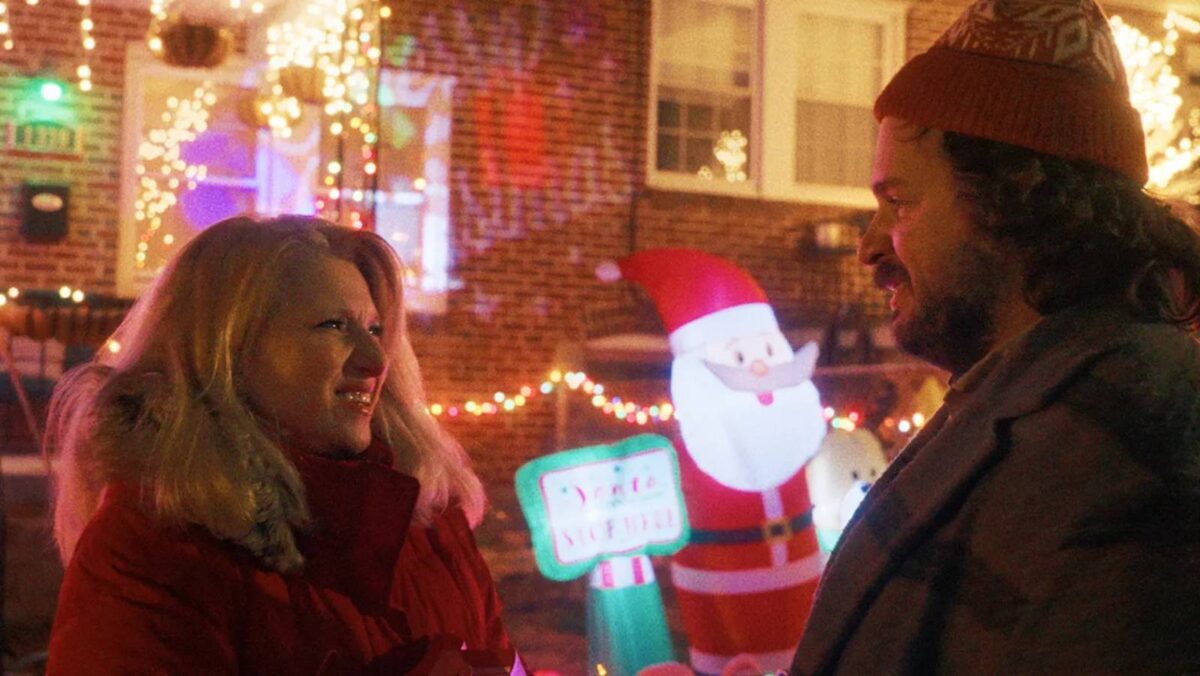
A return to form for Jay Duplass, who’s also making his solo-directing debut, The Baltimorons is a charming throwback to the low-budget indies he directed with his brother Mark. Written and starring burly stand-up comedian Michael Strassner, the Baltimore-set film follows the mis-adventures of an unlikely romantic duo: Strassner’s Cliff, a stand-up comedian six months sober, and his older workaholic dentist Didi (Liz Larsen). Cliff is bantering with his fiancée Brittany (Olivia Luccardi) when he falls and chips a tooth, sending him frantically searching for a dentist who will take him on Christmas Eve. Didi is the only one who takes his call, agreeing to meet him in her empty office for surgery. – John F. (full review)
Riefenstahl (Andres Veiel; Sept. 5)
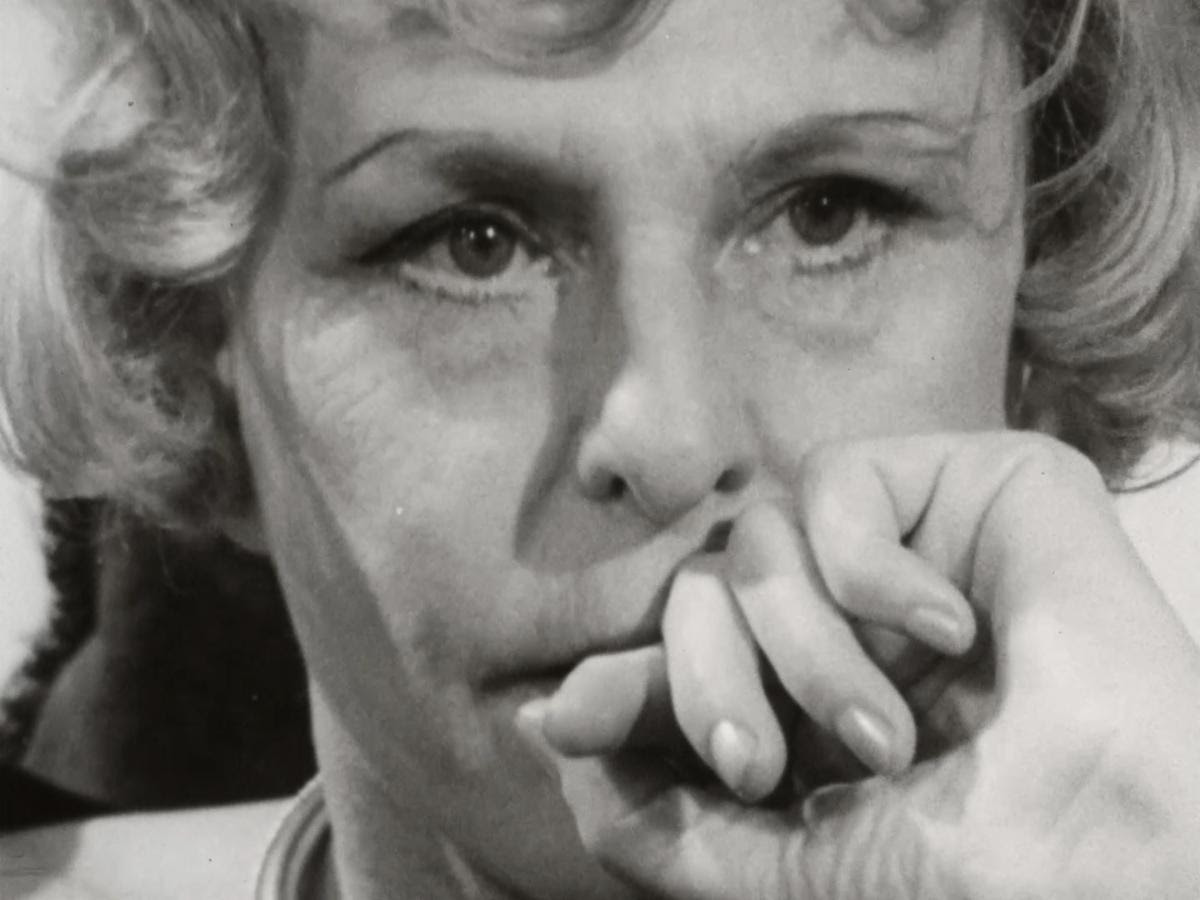
It is fascinating what the human mind will allow. Riefenstahl, a documentary directed by Andres Veiel about the life of Leni Riefenstahl, explores the rationalizations the filmmaker allowed herself in order to explain her collaborations with the Nazi Party in Germany during their time in power. Until the day she died (at 101 years old in 2003), Riefenstahl refuted accusations that she was aware of the crimes being committed around her. “I never saw any atrocities happening,” she says in an interview from 1976, after the interviewer presents her with an account of her witnessing the murder of 22 Jews. She denies it adamantly. Throughout the film, we watch her deny much, while separate information suggests she was more aware of the evil around her than she ever let on. How much did Leni Riefenstahl know when she was working directly with Hitler and his team of monsters? – Dan M.
The History of Sound (Oliver Hermanus; Sept. 12)
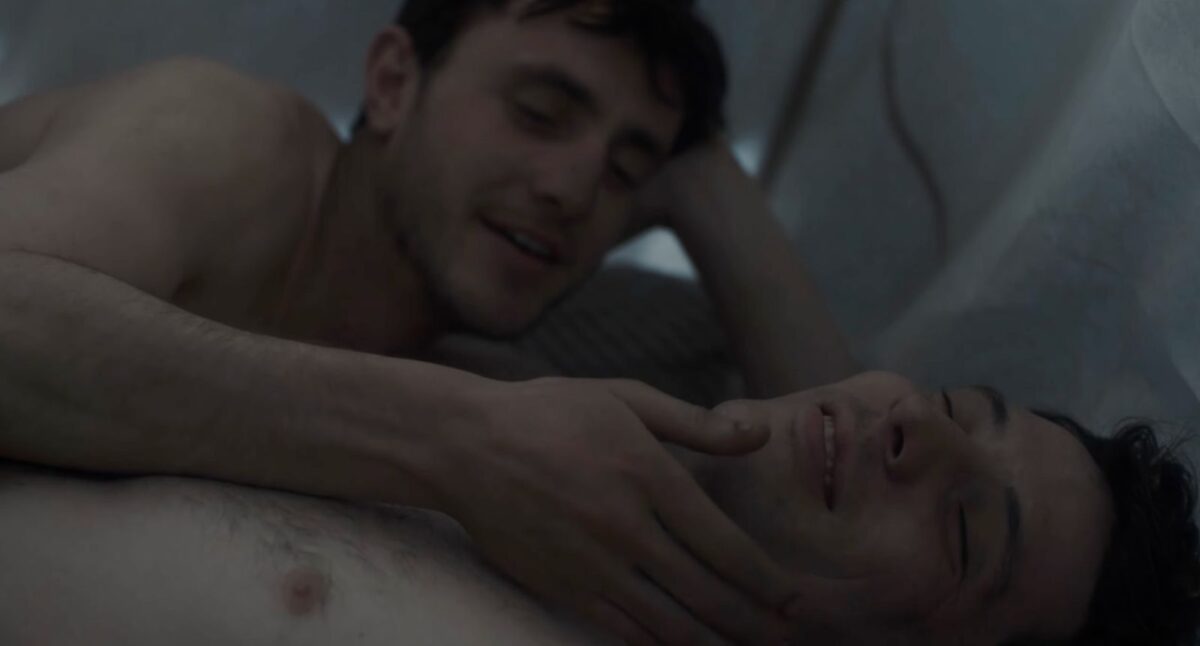
It’s strange to hear backwood Appalachian fiddle folk in a French theater at the hand of a South African director portraying the queer, song-collecting lives of two American men who are madly, delicately in love and played by British stars. Thanks to Paul Mescal, it’s also quite lovely. The History of Sound––Oliver Hermanus’ hushed ode to New England’s rich tapestry of folk history, adapted by Ben Shattuck from his short-story collection of the same name––is a tenderly felt drama sung in whisper and sorrow, the kind that almost guarantees a cry for anyone weakened by a phenomenal homegrown voice or piercing romance. Its alternately hyper-specific and vast range of vocals, styles, and tunes suggest the minor dawning of a lesser-known American sound. – Luke H. (full review)
Dreams (Dag Johan Haugerud; Sept. 12)

While this summer had its fair share of sequels, leave it to Dag Johan Haugerud and Strand Releasing to roll out an entire trilogy of films across the season. The final entry in the Norwegian filmmaker’s Oslo Trilogy, his Berlinale Golden Bear winner Dreams, will now arrive this September. The film follows Johanne, a young woman who documents her first love––an infatuation with her teacher––through intimate writing. – Jordan R.
Sunfish (& Other Stories On Green Lake) (Sierra Falconer; Sept. 12)

Filmmaker Sierra Falconer’s Sunfish (& Other Stories on Green Lake) captures a bittersweet feeling. That feeling of endings and beginnings, happening at the same time. For eighty minutes, we watch four short stories unfold in and around Green Lake. One involves a young girl (Maren Heary) learning how to sail after being dumped at the doorstep of her grandparents’ lake house by her neglectful mother. Another concerns a young boy (Jim Kaplan) at the fancy summer camp on the other side of the lake. He’s facing intense pressure from his mother to make first chair violin in the camp orchestra. An extended sequence of him practicing is particularly tense. The third story features an overworked young mother (Karsten Liotta) seduced by adventure in the form of a charming, wayward bar patron (Dominic Bogart) and a once-in-a-lifetime fish to be caught. Finally, there’s the lovely tale of two sisters (Tenley Kellogg and Emily Hall) running a lakeside bed-and-breakfast, the older of the two teaching the younger every needed task to completion before leaving for college. – Dan M. (full review)
Happyend (Neo Sora; Sept. 12)
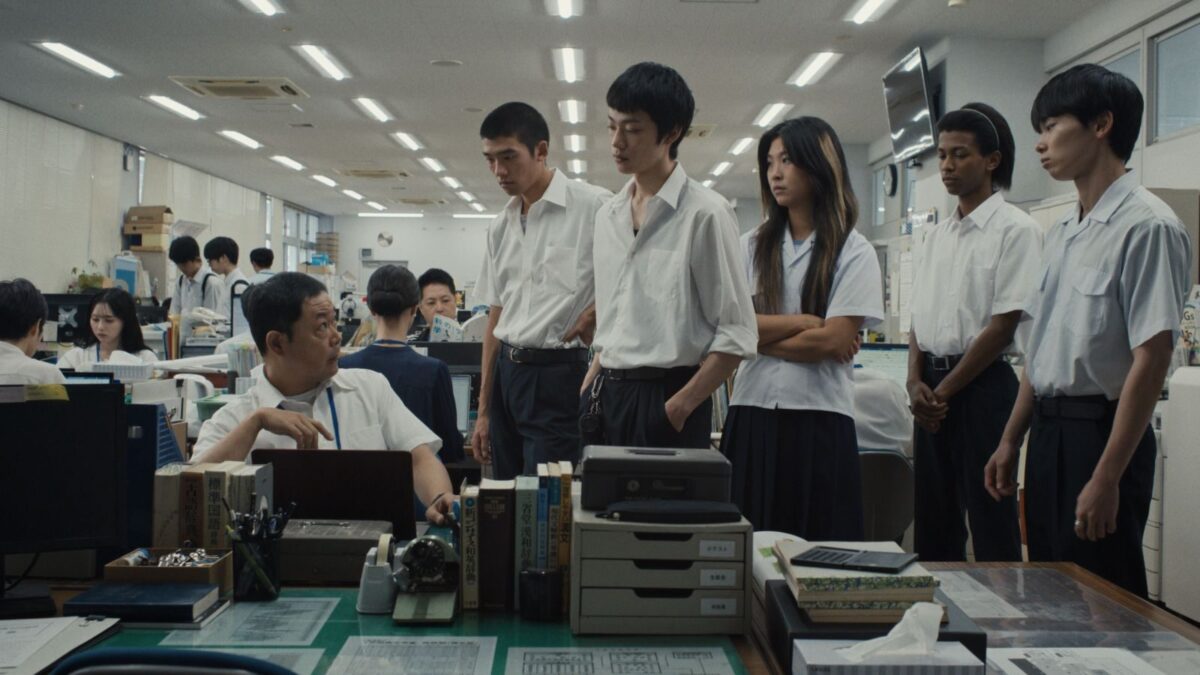
“Something big is about to change,” is surely one ominous beginning for a debut fiction feature, but director Neo Sora knows how to calibrate the fine balance between anticipation and inevitability. A story set in the near future, Happyend makes Tokyo a vast playground to high-school seniors gathered around childhood pals Yuta (Hayato Kurihara) and Kou (Yukito Hidaka). Life is blooming and the future is ripe for those teenagers, even if the whole city is constantly preparing itself for a catastrophic earthquake. Daily drills and false alarms interrupt an otherwise-smooth rhythm where Yuta and Kou gather their classmates at their Music Research Club, an extracurricular that’s more enjoyable than practical in purpose. With a fully equipped school room at their disposal at all times, the gang can build a secure microcosm for the shared love of electronic avant-garde and a generally good time. – Savina P. (full review)
Where to Land (Hal Hartley; Sept. 12)
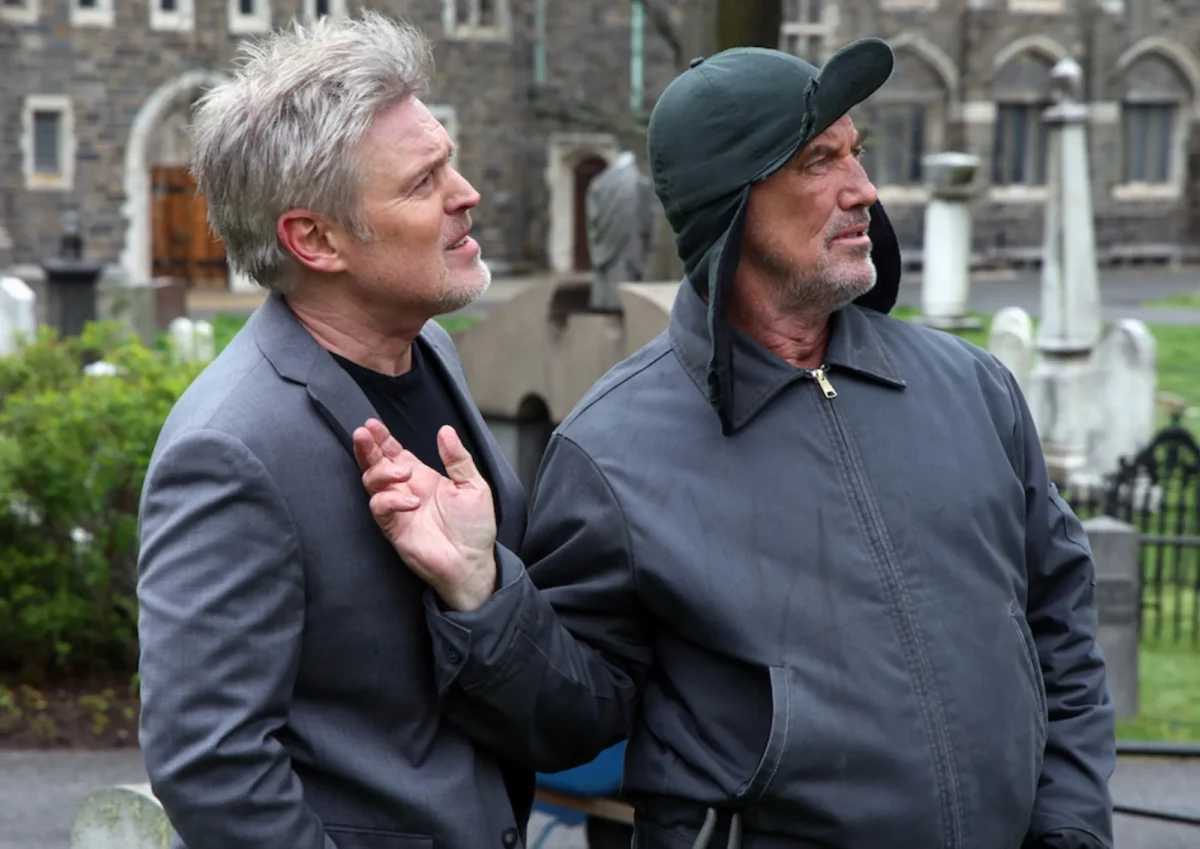
Much like the great slapstick auteur Preston Sturges, indie stalwart Hal Hartley has always been able to tap into the contradictions, uncertainties, and swooning emotions of a specific era much sooner than any of his contemporaries. Where to Land, Hartley’s great new film about a famed rom-com filmmaker who has reached a philosophical and moral crossroads, does just that for this stressed-out moment in history. Mixing Hartley’s patented machine-gun banter with a deep sense of empathy and surprise, the film seamlessly critiques modern America’s culture of assumption and opportunism that threatens to derail us from seeing what matters most in our daily lives. Where to Land is a true marvel of a movie: equally enthralled by wind in the trees and a momentary pause in conversation, patiently rediscovering a calm power that resides in-between the chaos of 21st-century existence. – Glenn H.
A Big Bold Beautiful Journey (Kogonada; Sept. 19)
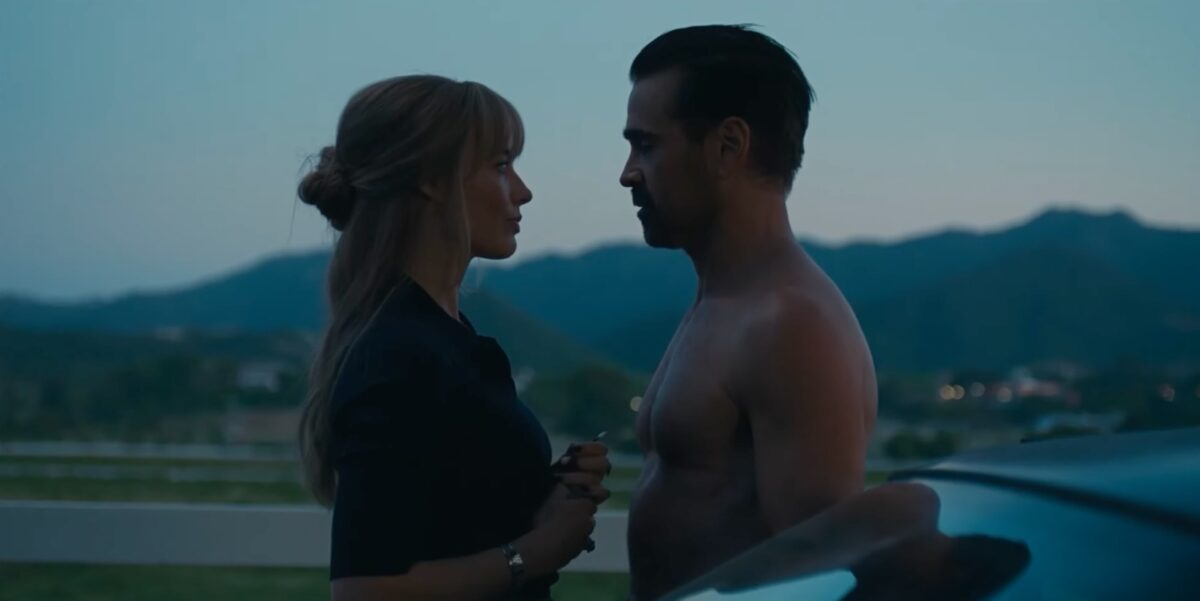
Following his tender, formally precise indie dramas Columbus and After Yang, video-essayist-turned-filmmaker Kogonada is stepping up to the big leagues with his next project. The Seth Reiss-scripted A Big Bold Beautiful Journey, starring Margot Robbie and Colin Farrell, was once set to kick off the summer movie season. However, Sony Pictures moved it to the more awards-friendly fall season, where it’ll now be released on September 19. Though it’s curiously skipping festivals, we’re hoping the director transitions up, Farrell in tow once again, with swooning imagination. – Jordan R.
Predators (David Osit; Sept. 19)

Filmmaker David Osit gives viewers a lot to wrestle with in Predators, his documentary about the reality show To Catch a Predator, which captured the zeitgeist of the early 2000s. In the show, host Chris Hansen confronted adult men who had arrived to a location (following an online chat correspondence) with the alleged intention of engaging in sexual activity with a minor. The set-up was, in fact, a sting orchestrated by the show’s producers in collaboration with local law enforcement. It made for compelling television and was advertised like so, as well as a public good. Predators wrestles with the legacy of the program, the ethical questions it raised, and the copycat vigilantes it inspired. The show was cancelled not long after suspect Texas assistant district attorney Bill Conradt committed suicide as cameras and cops were descending on his home. A cascading level of criticism was soon drawn against the production, putting into question whether the evidence obtained on camera was, in fact, admissible in a court of law. Hansen, after all, is not law enforcement. – Dan M. (full review)
Plainclothes (Carmen Emmi; Sept. 19)
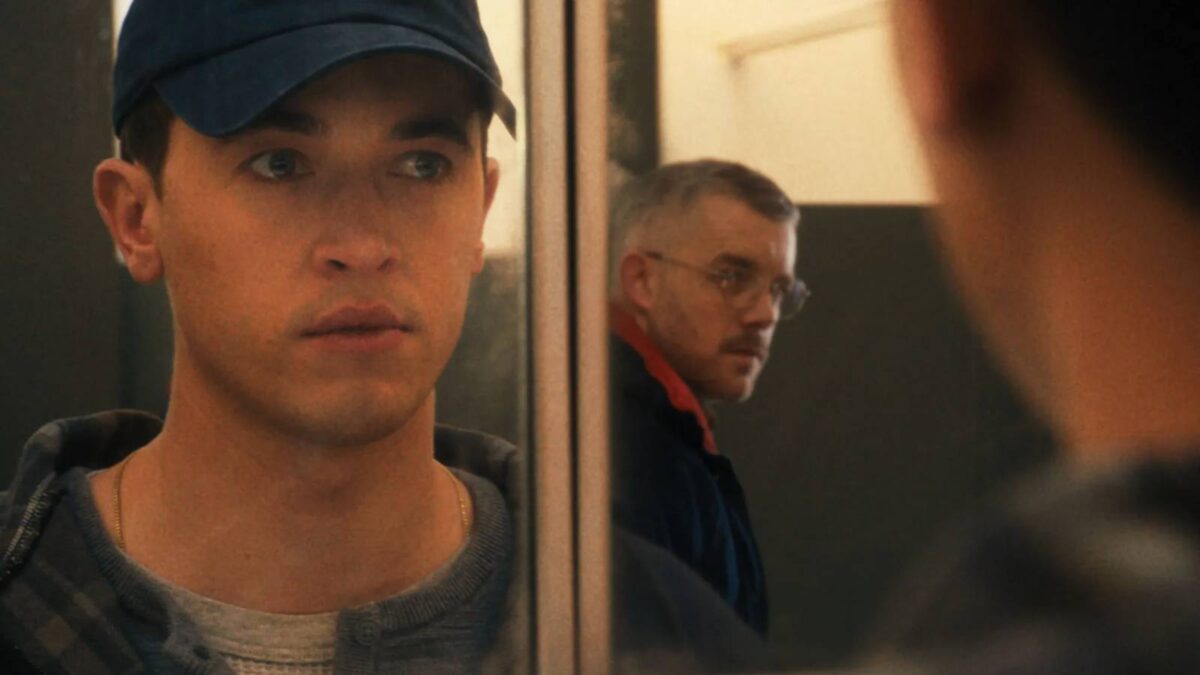
Set years before George Michael’s arrest and inspired by the bathroom raids that provoked a moral panic in Mansfield, Ohio, in 1963, Carmen Emmi’s Syracuse-set thriller Plainclothes offers a unique twist on the coming-out genre. Cruising the food court and men’s room at a local mall, young undercover officer Lucas (Tom Blyth) lures men into stalls, getting them to expose themselves before they’re taken down by a cop (John Bedford Lloyd) who is not above slapping a fellow officer on the butt in the gym, a thread the film never quite pulls fully at. – John F. (full review)
MEGADOC (Mike Figgis; Sept. 19)
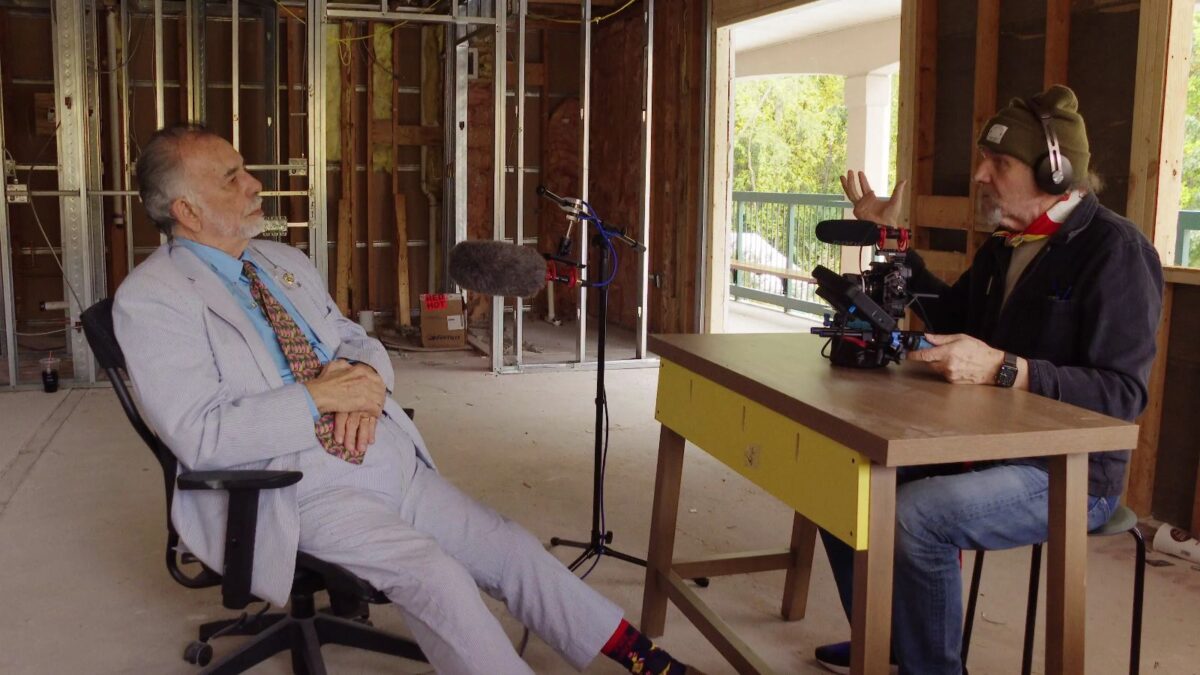
As is the case with the ambitious, ceaselessly imaginative mind of Francis Ford Coppola, the behind-the-scenes tales of films can be just as entertaining as the final artistic statement. We now have the definitive look at the making of Coppola’s long-in-the-works passion project Megalopolis from filmmaker Mike Figgis, who had intimate access to every facet of the production. Arriving one year after Coppola’s own release, the documentary will bow at Venice and, thankfully, be followed quickly by a theatrical release. – Jordan R.
One Battle After Another (Paul Thomas Anderson; Sept. 26)
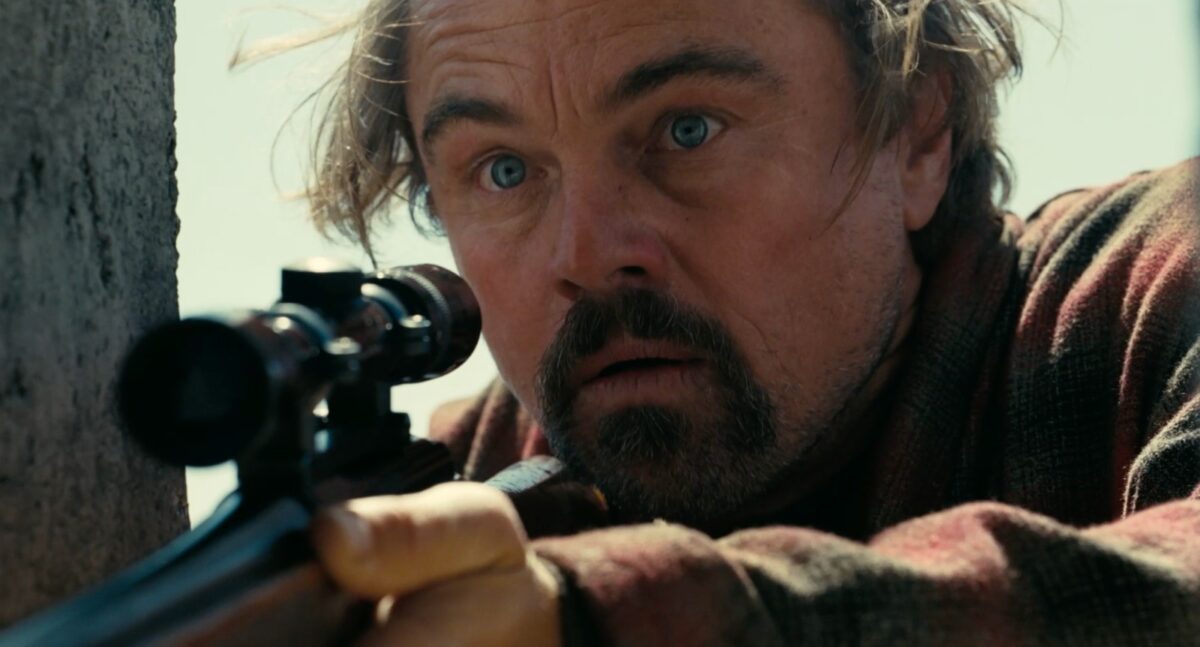
If this list were ranked, there’s no question what would top it. It’s hard to believe we’re now just one month away from the release of Paul Thomas Anderson’s highly anticipated One Battle After Another. The director’s biggest-budgeted film yet, complete with an IMAX and 70mm roll-out, marks PTA’s long-awaited collaboration with Leonardo DiCaprio after they attempted to work together for Boogie Nights some three decades ago. The action-thriller-comedy draws from Thomas Pynchon’s sprawling 1990 novel Vineland––while the novel was set in the Reagan era, PTA has shifted to the modern day, telling the story of a father who has left behind his radical past and is now living a quiet life on the lam with his daughter. When Sean Penn’s white supremacist Colonel character returns from the past to track them down, they must go on the run. With a cast also featuring Regina Hall, Teyana Taylor, Benicio del Toro, Chase Infiniti, Wood Harris, and Alana Haim, we reported from the first test screenings that the film features “loads of action and car chases”––including a “phenomenal” one in the climax––and is the “closest we’ll ever get” to a full-on PTA action movie. – Jordan R.
The Ice Tower (Lucile Hadžihalilović; Oct. 3)
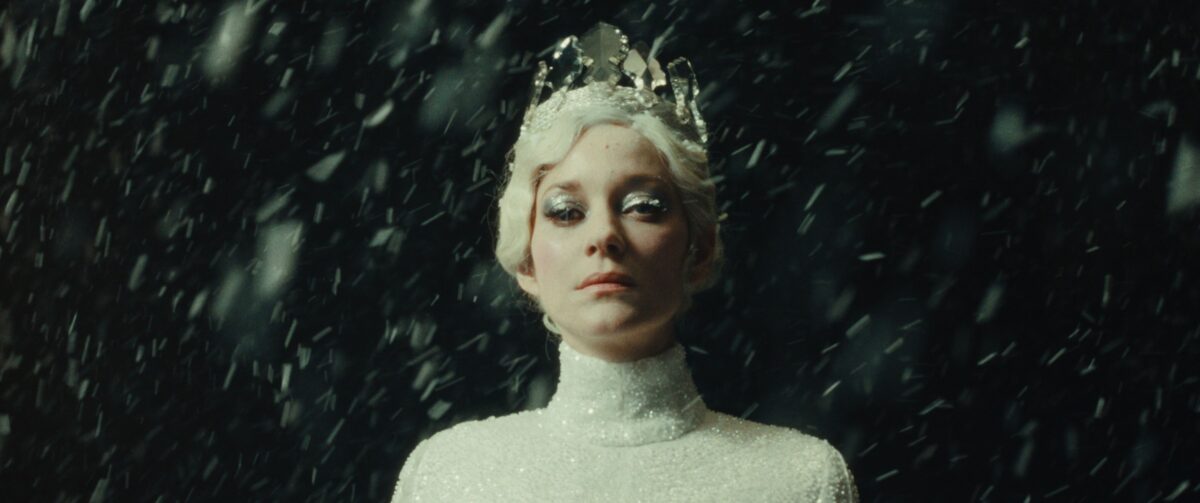
If there is a filmmaker whose work can be described as “elemental cinema,” that’s Lucile Hadžihalilović. It’s easy to chronicle her 2015 film Evolution as fluvial for its many water (and underwater) scenes, but also how its rhythmic flow steers the mysteries of a post-humanist plot. One might say that Innocence is earthy with a soil that’s dry––there, the woods are where secrets are concealed––and the San Sebastian Special Jury Prize winner Earwig is as ethereal as it is enigmatic. The way Hadžihalilović borrows from elements serves to alchemize the images we see onscreen, lacing them with a thin veil of unknowability. Yet their meaning is never fully out of reach; these are coming-of-age stories at their core. Hadžihalilović’s newest film, The Ice Tower, was billed as her most accessible work yet, borrowing from a source more familiar than she has before: Hans Christian Andersen’s fairytale “The Snow Queen.” – Savina P. (full review)
The Smashing Machine (Benny Safide; Oct. 3)
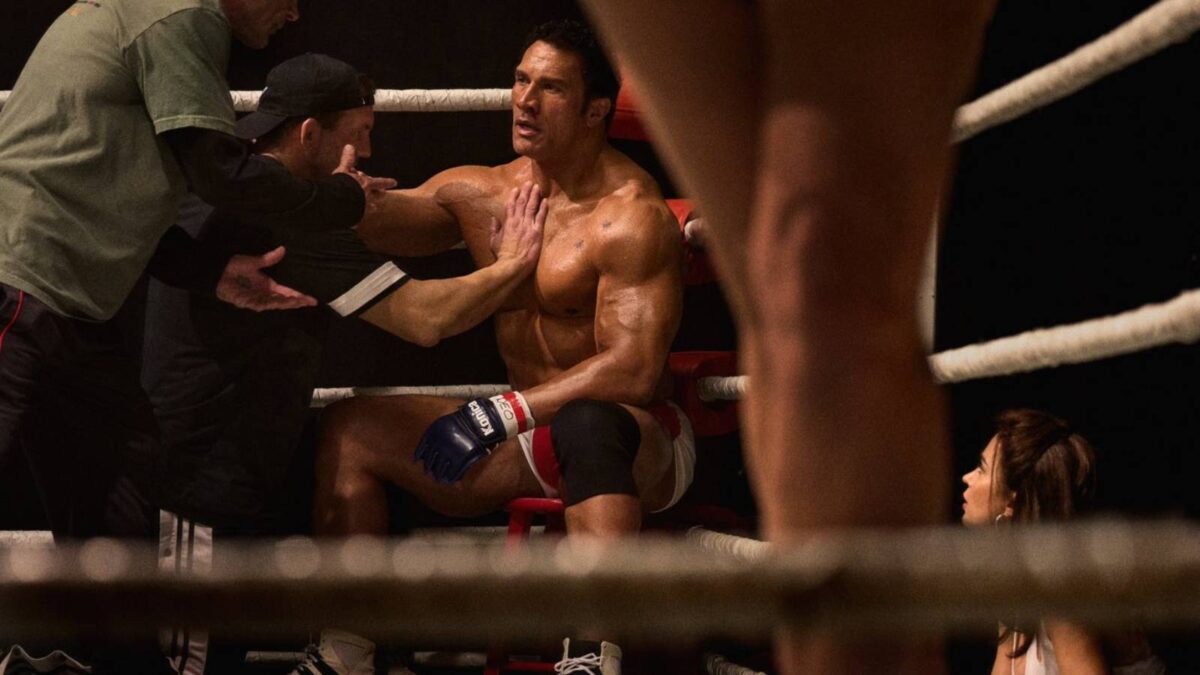
Safdie season kicks off this October with Benny Safdie following the brilliant The Curse with a desperately needed career rejuvenation for Dwayne Johnson. The Smashing Machine, set to launch at the Venice Film Festival ahead of an October release, is also a Jungle Cruise reunion between Johnson and Emily Blunt, and captures the story of legendary MMA fighter Mark Kerr, who faced addiction and a rocky marriage with Dawn Staples (Blunt). While the trailer sells something a bit more conventional than one might expect, we’ve heard there’s something darker lurking under the surface of this character study. – Jordan R.
Anemone (Ronan Day-Lewis; Oct. 3)
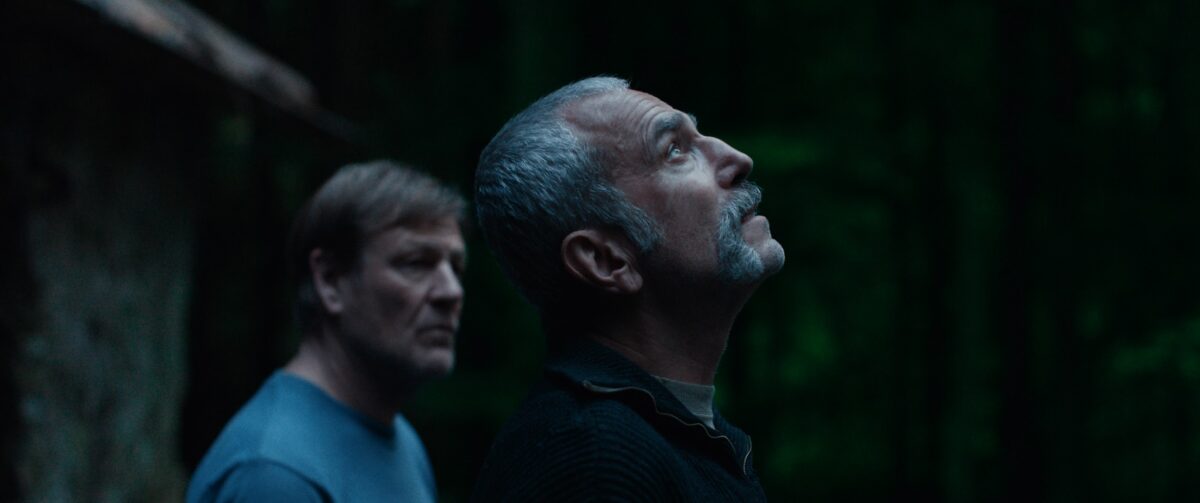
It’s only fitting, in a season where we’re getting a new Paul Thomas Anderson film and a five-hour documentary on Martin Scorsese, that one of their greatest collaborators is finally making his return. Daniel Day-Lewis has ended his post-Phantom Thread retirement for Anemone, which his son Ronan Day-Lewis, in a feature debut, is directing from a script that’s co-written by his father. Described as exploring intricate relationships between fathers, sons, and brothers, and the dynamics of familial bonds, it’ll world-premiere at the New York Film Festival ahead of an early October release. – Jordan R.
Roofman (Derek Cianfrance; Oct. 3)

It’s been nearly a decade since the last feature from Blue Valentine and The Place Beyond the Pines director Derek Cianfrance, but he is finally returning for what looks to be his most crowd-pleasing film. Roofman, starring Channing Tatum, Kirsten Dunst, Ben Mendelsohn, LaKeith Stanfield, Juno Temple, Melonie Diaz, Uzo Aduba, Lily Collias, Jimmy O. Yang, and Peter Dinklage, follows the true-life story of a robber who ended up escaping jail and lived in a Toys ‘R Us and Circuit City store in North Carolina where he was caught after leaving his fingerprints on a Catch Me If You Can DVD. A tale as old as time. – Jordan R.
If I Had Legs I’d Kick You (Mary Bronstein; Oct. 10)
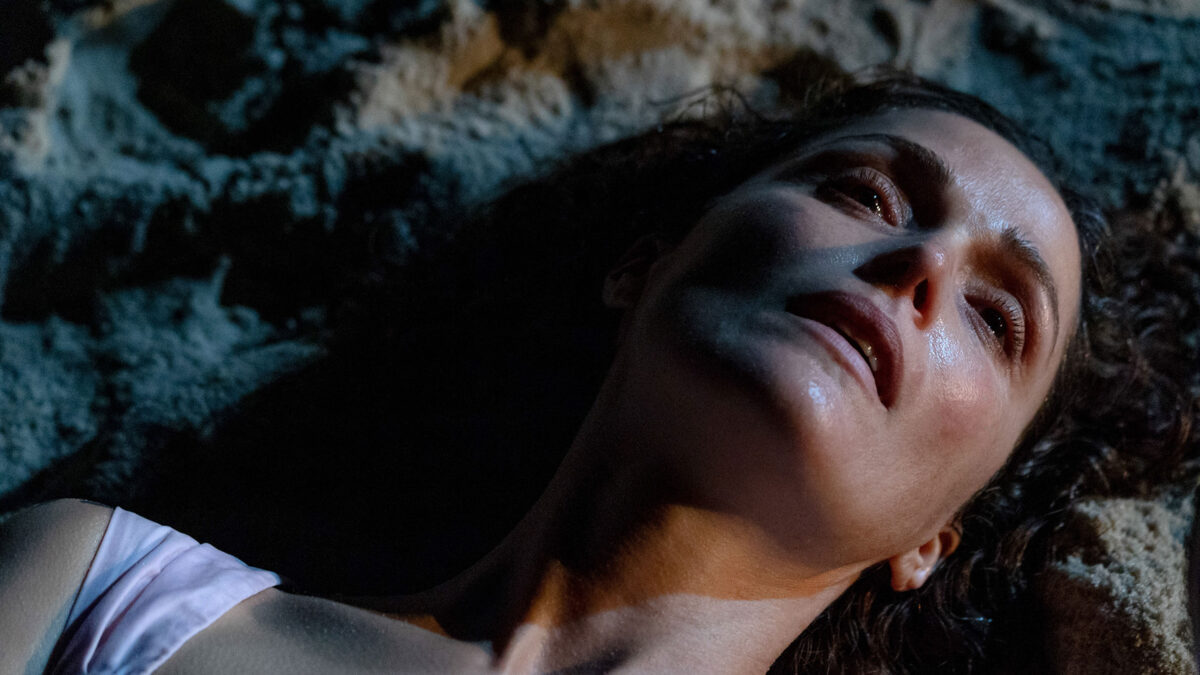
Many films, from the classic melodrama Mildred Pierce to last year’s playful dramedy Nightbitch, have tried to depict the unique struggles of motherhood with a focus on the special intimacy of child-rearing. Mothers have long borne the brunt and most of the blame for how their children behave in the world. Fatherhood is considered more optional, and the bar to clear for being good at it is much lower. These may seem like obvious statements, but they bear repeating in an American society that villainizes birth control and abortion. America wants women to bear children and then provide them with none of the emotional or monetary support for them to thrive and have their own personal lives. In recent years, filmmakers have tried to illustrate the darker side of motherhood, with films like Tully getting at the exhaustion and loss of self that can happen therein. In the aforementioned Nightbitch, Amy Adams plays a woman who realizes how lost and hopeless she feels as a stay-at-home mother, having given up her career to spend more time with her son. No matter how often they cry out for help, our patriarchal society pressures them to push themselves all the way to the edge. – Jourdain S. (full review)
A House of Dynamite (Kathryn Bigelow; Oct. 10 in theaters and Oct. 24 on Netflix)

After taking the longest break of her career, the much-awaited return of Kathryn Bigelow is one of the fall’s major cinematic events. A House of Dynamite, a thriller which imagines the scenario of what happens when a single, unattributed missile is launched at the United States, features the sprawling cast of Idris Elba, Rebecca Ferguson, Gabriel Basso, Jared Harris, Tracy Letts, Anthony Ramos, Moses Ingram, Jonah Hauer-King, Greta Lee, Jason Clarke, Malachi Beasley, Brian Tee, Brittany O’Grady, Gbenga Akinnagbe, Willa Fitzgerald, Renée Elise Goldsberry, Kyle Allen, and Kaitlyn Dever. As U.S. politics become ever more precarious, we’re looking forward to seeing how Bigelow tackles our current fears head-on. – Jordan R.
Urchin (Harris Dickinson; Oct. 10)

A few scenes into Urchin, we take a trip through the Bardo. First the camera (as in a million films before this) closes in on a shower drain, but then something new: a tunnel of darkness and color that gives way to damp, mossy calm, where a lone man in a clearing, standing with his back to us, is taking in the light. The director of this intrepid sequence is Harris Dickinson, who has found the time––somewhere between becoming a beloved actor and sex symbol and playing John Lennon––to direct a thoughtful, adventurous film. – Rory O. (full review)
After the Hunt (Luca Guadagnino; Oct. 10)
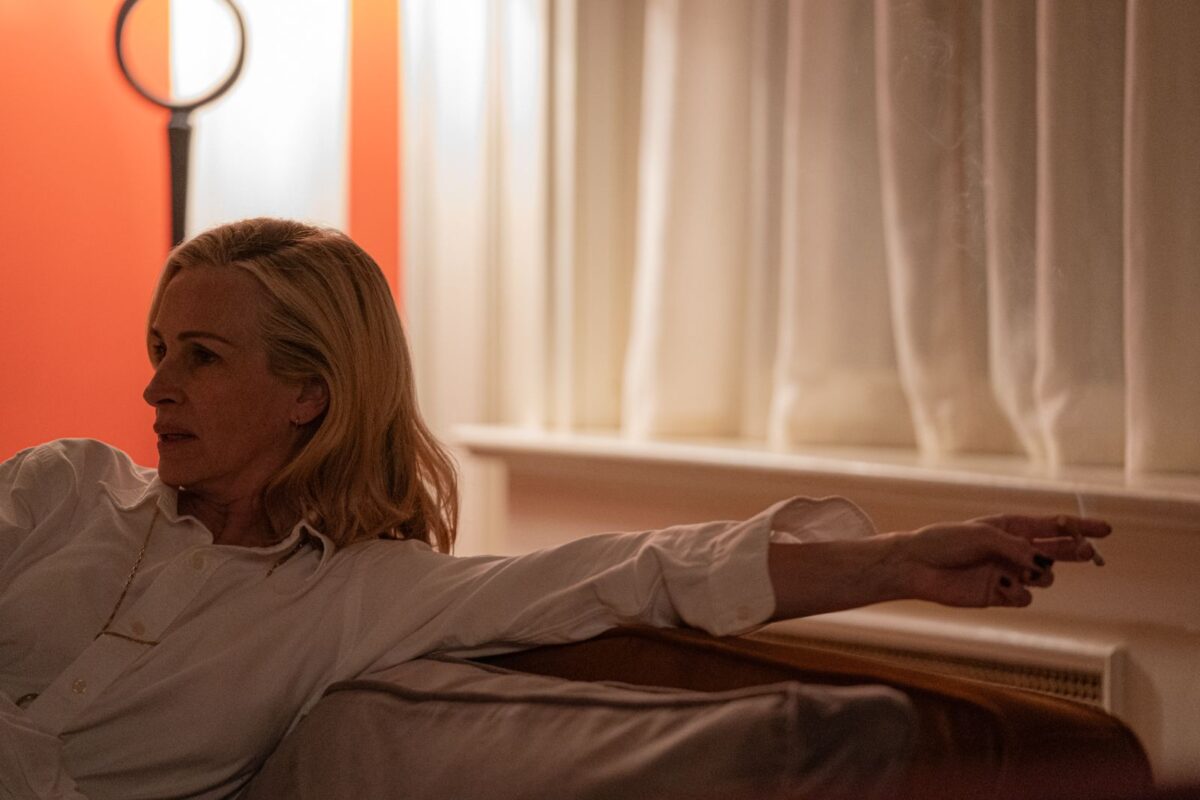
Following up the double dose of last year’s Challengers and Queer, Luca Guadagnino is back with the psychological drama After the Hunt, all while he shoots his next feature Artificial. Led by Julia Roberts, Ayo Edebiri, Andrew Garfield, Michael Stuhlbarg, and Chloë Sevigny, it follows a college professor who finds herself at a personal and professional crossroads when a star student levels an accusation against one of her colleagues. Marking the return of cinematographer Malik Hassan Sayeed (Belly, Clockers, He Got Game), it’ll premiere at Venice before coming to the New York Film Festival. – Jordan R.
The Perfect Neighbor (Geeta Gandbhir; Oct. 10 in theaters and Oct. 17 on Netflix)

First coming under wider scrutiny in 2005 when passed in Florida, the stand-your-ground law allows property owners to use deadly force to defend their home from trespassers. The foreseeable result has been an uptick in homicides and a proven racial bias when it comes to the number of white shooters and Black victims. While there’s an overwhelming amount of data and cases a documentary could explore on the issue, Geeta Gandbhir’s gripping, infuriating The Perfect Neighbor takes an objectively narrow, focused approach, exploring a single case in Florida primarily through police bodycam and CCTV interrogation footage. Initial police calls involving a neighbor upset at the children trespassing on her property shockingly escalates in a single moment; Gandbhir lets the footage speak for itself, creating a documentary far more upsetting and impactful than any number of talking heads could provide. – Jordan R. (full review)
Kiss of the Spider Woman (Bill Condon; Oct. 10)

In their dark, damp prison quarters, Malina (Tonatiuh) and Valentin (Diego Luna) only have each other for company. Valentin is a radical imprisoned for his revolutionary views; Malina is a window-dresser condemned for homosexual activities. Valetin wants nothing to do with Malina, focusing on his work as his cellmate flutters around their modest room trying to make the best out of a bad situation. To Valentin, Malina is a man who lacks substance and morals, living a life without dignity. Their room is decorated with Malina’s posters and trinkets procured by the guards, with his queerness implied to be the payment. “There are privileges in degradation,” he tells Valetin, who responds with disgust. Valentin remarks that Malina shouldn’t “make himself trivial.” Malina flaunts his queerness and Valentin displays no sexuality, but his straightness is implied––at least at first. As the two men slowly warm up to each other, Malina makes a suggestion: he will describe his favorite film, Kiss of the Spider Woman, to Valentin in order to pass the time in their miserable situation. And so begins their unlikely love story. – Jourdain S. (full review)
It Was Just an Accident (Jafar Panahi; Oct. 15)

If you were handed over the man who destroyed your life and those of countless others––a psychopath who tortured, raped, and murdered in the name of a tyrannical system––what would you do? Would you exact revenge or do the impossible––forgive and set him free? It Was Just an Accident, Jafar Panahi’s first film since his release from prison in Iran, hinges on that excruciating dilemma. The story is easy enough to summarize; its emotional wallop defies facile description. In an unexpected stroke of luck, four Iranians who did time for protesting the regime manage to abduct the guard responsible for the unspeakable atrocities they suffered behind bars. Having knocked him unconscious, they shove him in a van and travel around, wondering what to do. The whole journey spans less than a day. By the time it wraps, Accident feels like content under pressure. Panahi welds scorching social critique to a masterful command of form: a devastating cry for justice, his latest also serves as a superb thriller. It is a towering achievement. – Leonardo G. (full review)
Ballad of a Small Player (Edward Berger; Oct. 15 in theaters and Oct. 29 on Netflix)
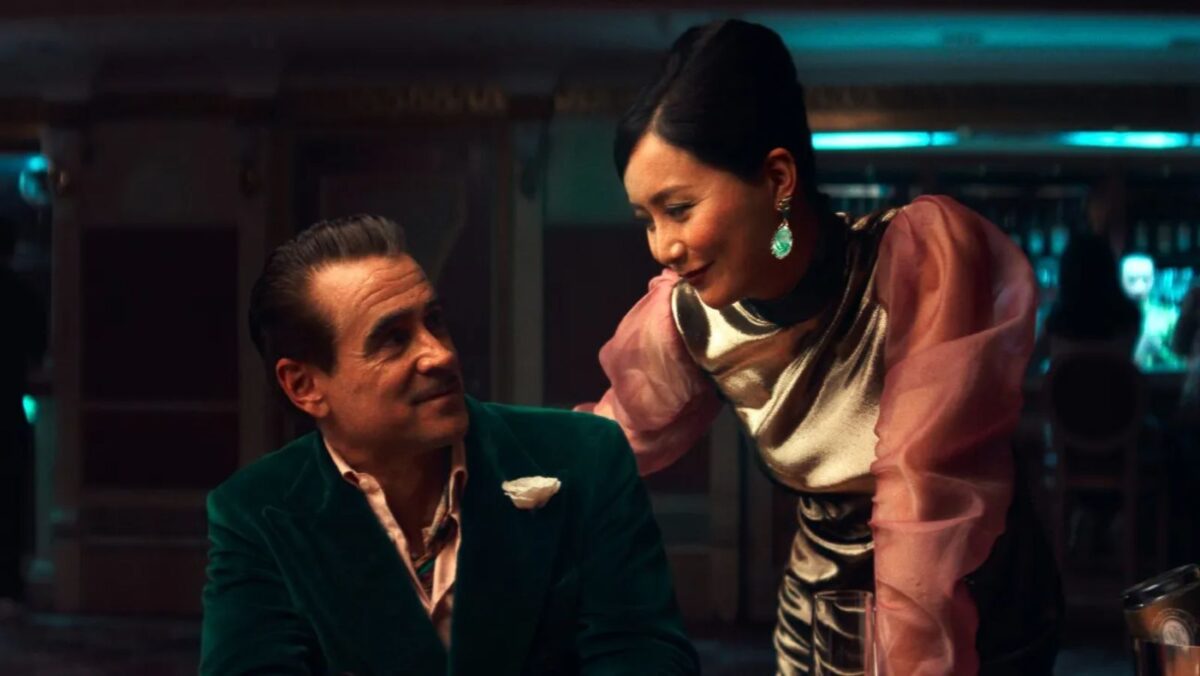
While Edward Berger made a splash with All Quiet on the Western Front and Conclave, we’re curious how his style lends to a more small-scale character drama. The Rowan Joffé-scripted Ballad of a Small Player stars Colin Farrell, Fala Chen, Deannie Yip, Alex Jennings, and Tilda Swinton in the story of a high-stakes gambler who, while laying low in Macau, encounters a kindred spirit who might just hold the key to his salvation. – Jordan R.
Blue Moon (Richard Linklater; Oct. 17)
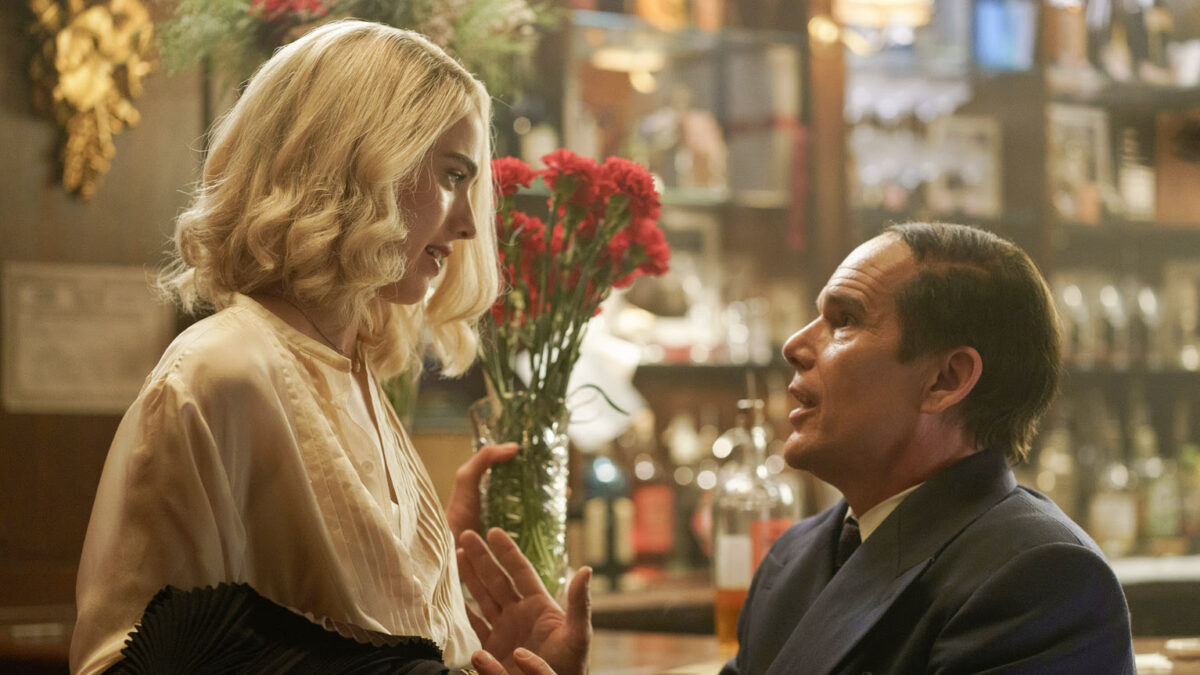
Blue Moon, which world-premiered at the Berlinale, is another beautifully personal work from Linklater, full of authorial idiosyncrasies and tics, but distinguishing the film from his corpus is it being the kind you can only make at a mature career stage. It’s not so much that Linklater has nothing to prove––screenplays like Robert Kaplow’s and its rarified, remote milieu of mid-WWII New York theaterland can typically send financiers balking. With a “legacy” career, little favors and gives come your way; for Linklater, maybe his next will be a legitimate awards contender, and new relationships with acting talent can be brought to bear. And different or lower expectations for the end product allow him to really express who he is as an artist at this point in his life. – David K. (full review)
The Mastermind (Kelly Reichardt; Oct. 17)
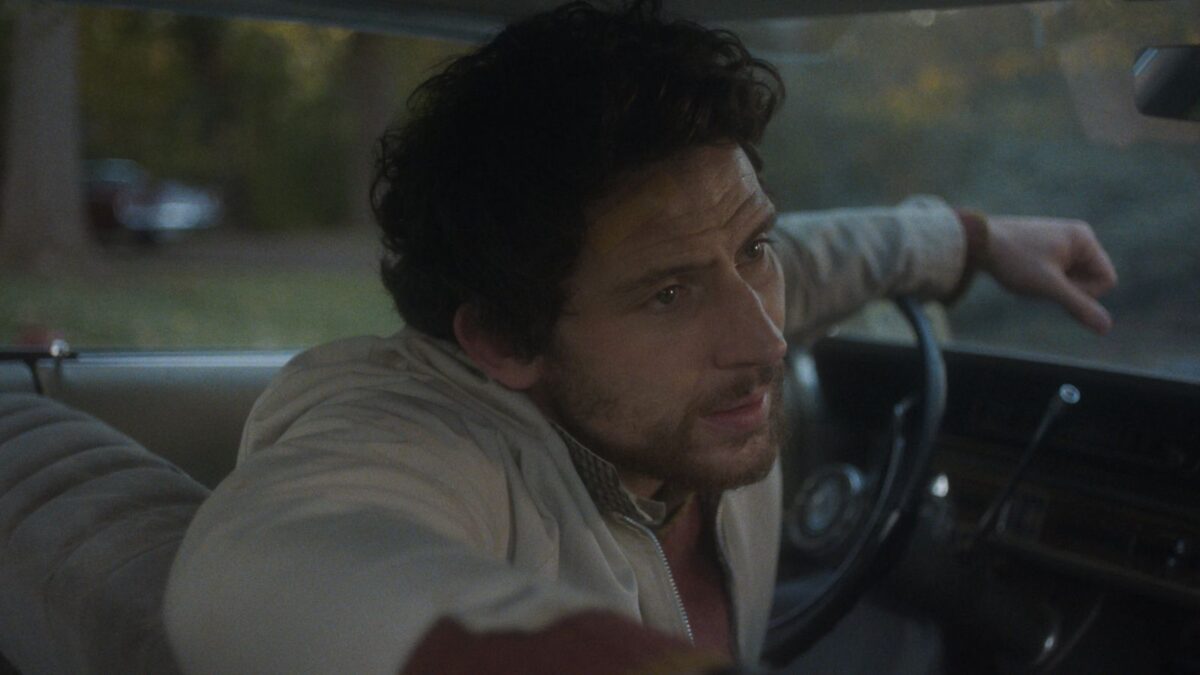
For the second time in three years, Cannes’ competition ends with a film in which Josh O’Connor plays a scruffy, late-20th-century man with some knack for pinching masterpieces. Following (spiritually or otherwise) Alice Rohrwacher’s La Chimera is Kelly Reichardt’s The Mastermind, an experiment in form so thorough and self-assured that even Robert Bresson might have appreciated it. Nobody expected the versatile director’s first heist movie to resemble Ocean’s 11, but The Mastermind is still remarkably low on flash. There is a jazzy score by Rob Mazurek and some even-jazzier opening credits, but this is very much a Reichardt joint: from its gorgeous, sylvan landscapes and autumnal color palette to the patient, observational tone, it suggests what robbing art in the early part of the 1970s might have truly felt like. – Rory O. (full review)
Frankenstein (Guillermo del Toro; Oct. 17 in theaters and Nov. 7 on Netflix)
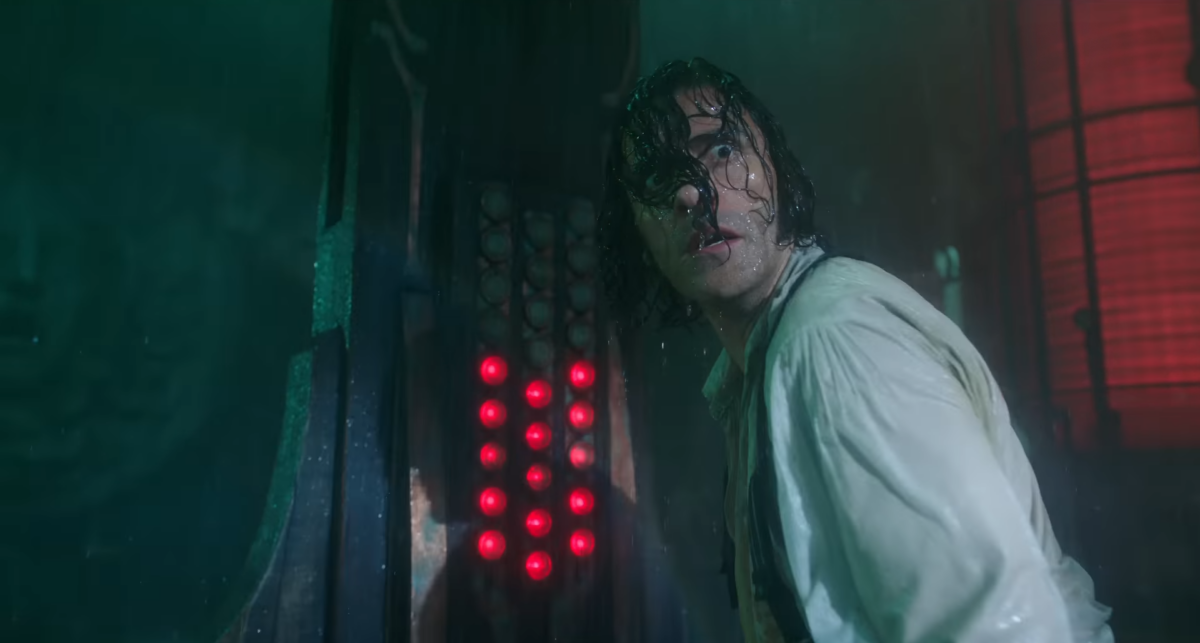
A film that feels like the perfect match of director and material, Guillermo del Toro’s Frankenstein will imminently premiere at the Venice Film Festival before opening this October. The Mary Shelley adaptation stars Oscar Isaac, Jacob Elordi, Mia Goth, Felix Kammerer, David Bradley, Lars Mikkelsen, Christian Convery, Charles Dance, and Christoph Waltz. “This has been, for me, the culmination of a journey that has occupied most of my life,” del Toro said. “I first read Mary Shelley’s Frankenstein as a kid and saw [star of the 1931 adaptation] Boris Karloff in, what became for me, an almost religious state. Monsters have become my personal belief system.” – Jordan R.
Bugonia (Yorgos Lanthimos; Oct. 24)
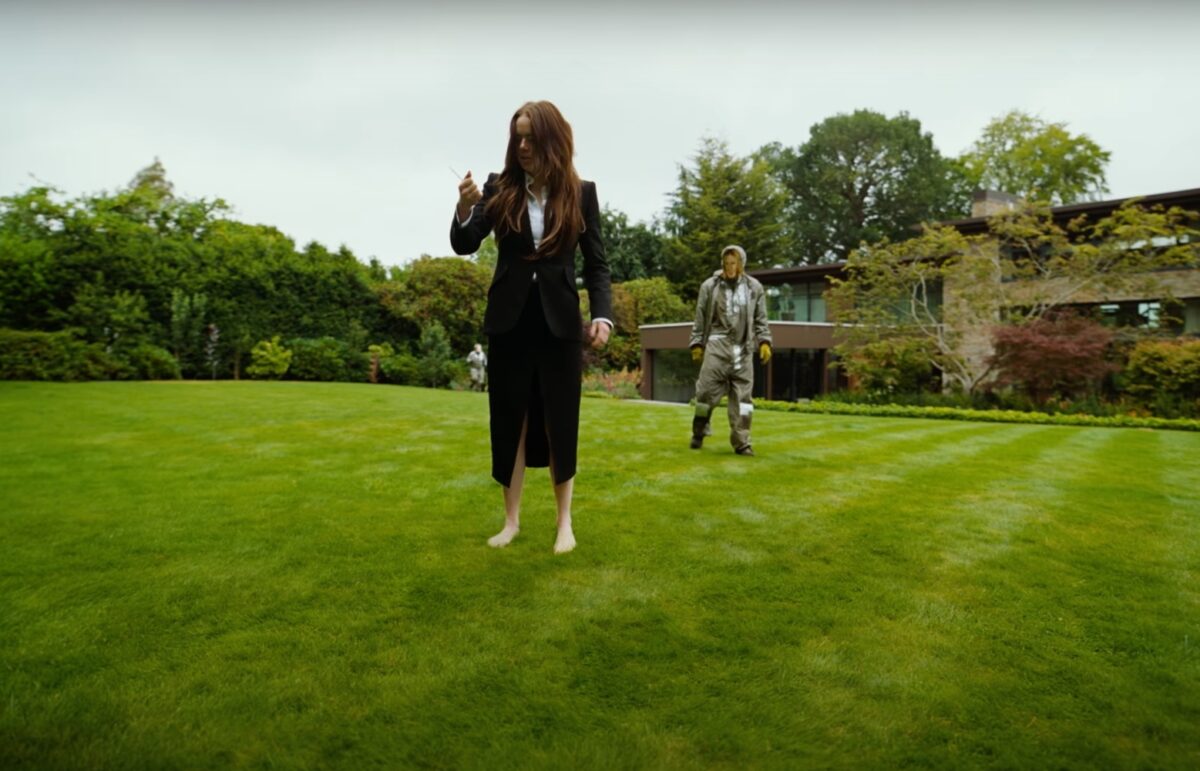
Following Kinds of Kindness, Yorgos Lanthimos has once again teamed with Jesse Plemons, Emma Stone, Robbie Ryan, and Jerskin Fendrix, this time for a new take on Joon-hwan Jang’s Korean cult classic Save the Green Planet. Bugonia, based on a script by Will Tracy (Succession), follows the kidnapping of a high-powered CEO of a major company, with the kidnappers convinced she’s an alien intent on destroying planet Earth. After recently catching up with the original, I’m curious how much Lanthimos sticks to its rather strange execution, particularly the rather bold, go-for-broke ending. – Jordan R.
Nouvelle Vague (Richard Linklater; Oct. 31 in theaters and Nov. 14 on Netflix)

Shot on black-and-white film with the same Cameflex model used by Jean-Luc Godard for Breathless––the film it portrays and embodies the making of––Nouvelle Vague is not merely an imitation of Godard. It’s a theft of Godard for a creation all its own, which is a strange thing to say about a movie that looks and feels so much like the one that inspired it. Richard Linklater’s newest, despite suggesting no form of his past work, rings much like Linklater. – Luke H. (full review)
Put Your Soul On Your Hand and Walk (Sepideh Farsi; Nov. 5)

One of the most heartbreaking documentaries of the year, Sepideh Farsi’s Put Your Soul On Your Hand and Walk premiered at Cannes just weeks after the Israeli occupation murdered the film’s subject, 25-year-old Palestinian photojournalist and poet Fatma Hassona. Constructed through passages of the director speaking with Hassona through FaceTime conversations, we get a glimpse at the day-to-day life under siege, both a powerful testament of living through terror and a damning cry for the Israeli government to stop destroying innocent lives. – Jordan R.
Rebuilding (Max Walker-Silverman; Nov. 7)
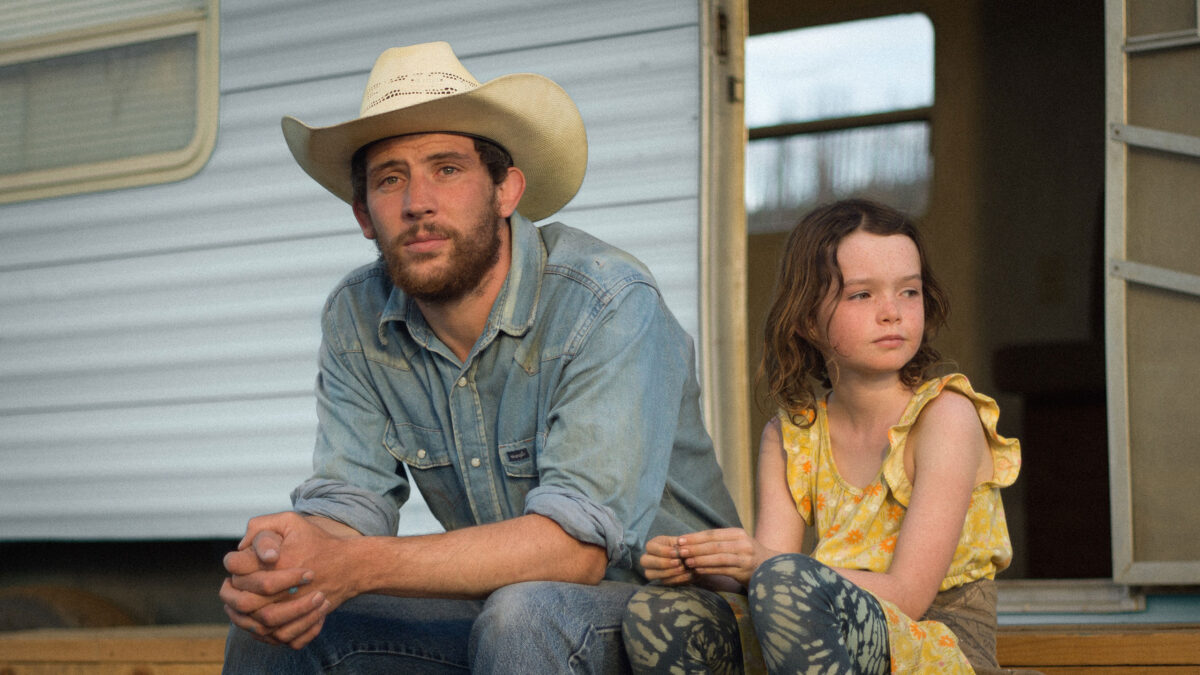
We can all feel lonely. Even if we’re constantly surrounded by people, we can find ourselves detached or isolated––lost in our own minds. For some, that feeling is brought on by devastation. The kind that arrives out of nowhere, takes everything, and leaves rubble. Many of us see it in the news, think “how awful,” maybe donate some money, but chalk it up to the indifference of fate and move on. In Rebuilding, Max Walker-Silverman considers if loss and destruction are part of life, then healing and rebirth must be, too. – Kent M. W. (full review)
Die My Love (Lynne Ramsay; Nov. 7)
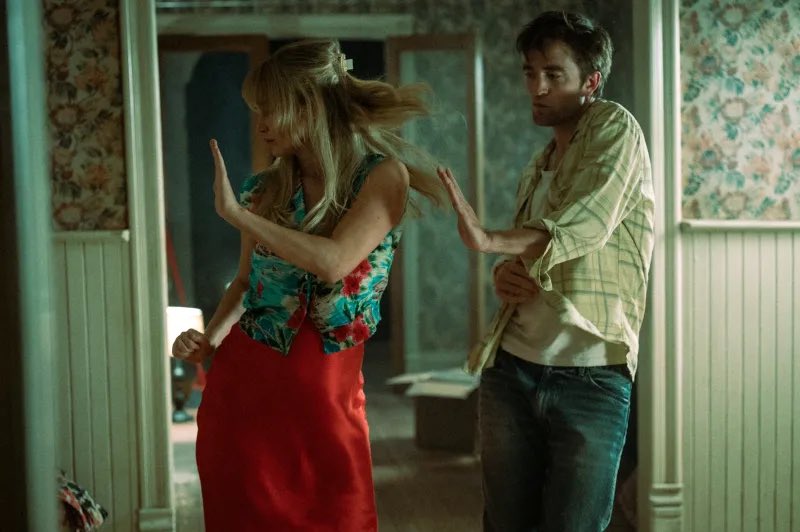
Near the climax of Lynne Ramsay’s You Were Never Really Here, two assassins––one well-dressed but dying, the other ragged but definitely alive––laid together on a kitchen floor, their hands lightly touching as Charlene’s “Never Been to Me” drifted in from a nearby radio, the lyrics barely escaping the wounded man’s mouth. That shock of counterpoint elevated what was, until then, a clinically well-executed revenge picture into something approaching the sublime. Ramsay plays that card again with less-convincing results in her long-awaited follow-up Die My Love, a visceral, coiled film about a woman in the throws of a mental breakdown. As ever, Ramsay’s soundtrack choices are equal-parts fun and unpredictable, not least David Bowie’s “Kooks” on a car radio or the director herself warbling an acoustic cover of “Love Will Tear Us Apart” over the closing credits––fitting choice for a work of toxic love and the things we do to our better halves, with little joy in the division. – Rory O. (full review)
Sentimental Value (Joachim Trier; Nov. 7)
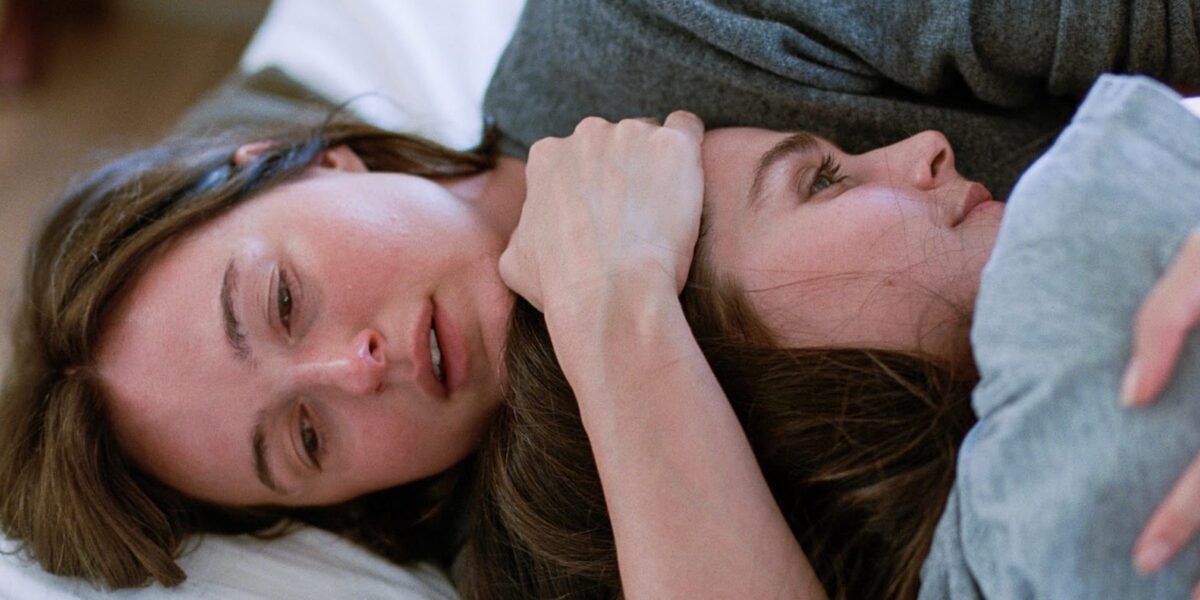
Over a delicately structured, Mike Mills-ian montage of Nora Berg’s (Renate Reinsve) personal heritage––30-odd years of an Oslo native’s existence relayed in a sparse collection of seminal moments, feelings, and thoughts, then layered into the lives and characteristics of those that preceded her––the wizened voice of a grandmother ushers us into Sentimental Value, Joachim Trier’s intergenerational drama about processing (if not healing) family trauma through art. – Luke H. (full review)
Peter Hujar’s Day (Ira Sachs; Nov. 7)
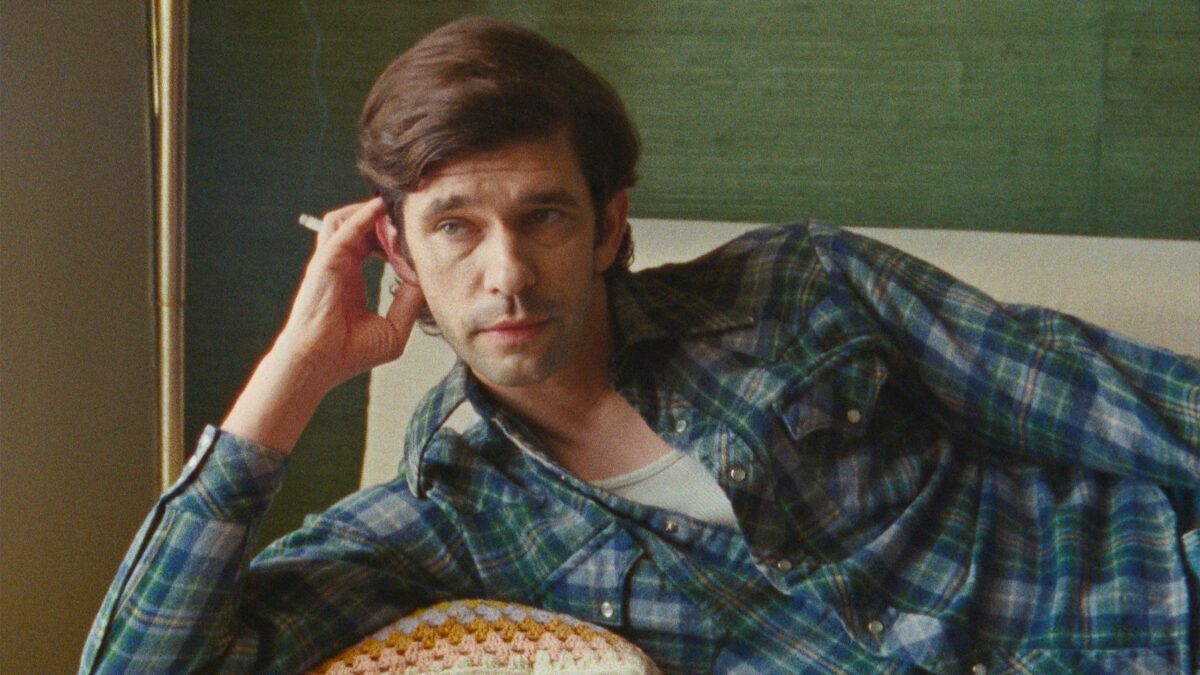
When I look at Peter Hujar’s portrait of poet Allen Ginsburg, taken on December 18, 1974, it’s strikingly nonchalant. Ginsberg is standing on the sidewalk, one hand in pocket and the other looped through the straps of a bag draped on his shoulder. He’s looking right down the barrel of the lens with an “okay, you’re taking my picture” expression on his face. Ginsberg is perhaps the most recognizable name to come out of the beat generation of poets but he looks like he could be anybody––he could be your buddy Carl. It was taken for the New York Times but certainly doesn’t have the gloss and sophistication of celebrity portraits we see in major publications today. The austere street beside him is on the Lower East Side, a neighborhood now flooded with tourists, boutiques, and banality. Just as Hujar’s photo is indicative of an era of artistic renaissance in New York City, so is Ira Sachs’ Peter Hujar’s Day. – Kent M. W. (full review)
The Running Man (Edgar Wright; Nov. 7)
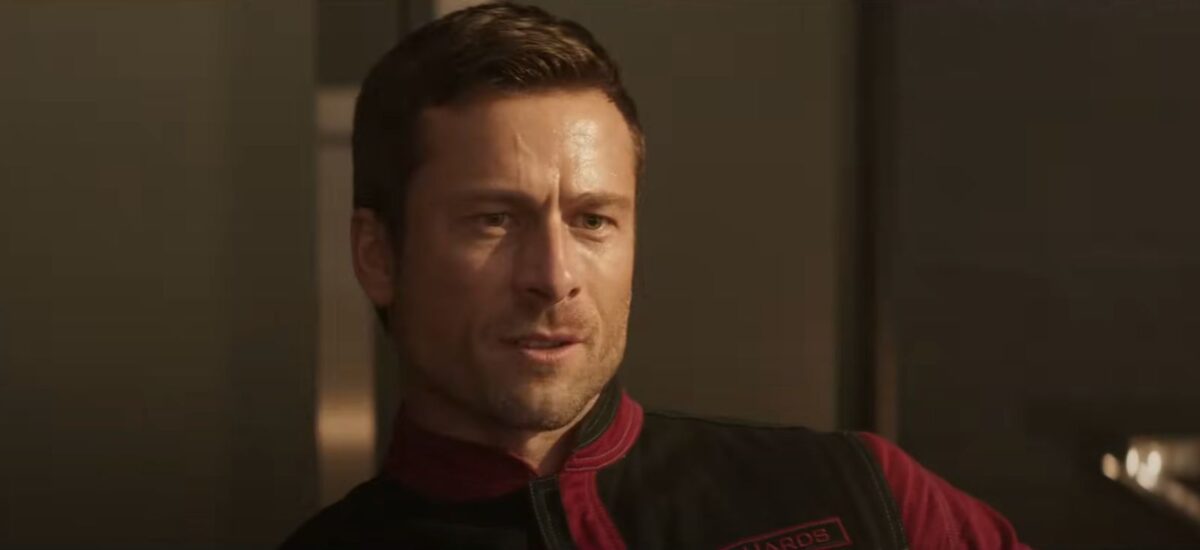
After a busy last summer with Hit Man and Twisters, Glen Powell is back this fall with Edgar Wright’s adaptation of Stephen King’s The Running Man. With a cast also including Katy O’Brian, Daniel Ezra, Karl Glusman, Josh Brolin, Lee Pace, Jayme Lawson, Michael Cera, Emilia Jones, William H. Macy, David Zayas, Sean Hayes, and Colman Domingo, the dystopic thriller will hopefully be a bounce back for the director after the stylish yet hollow Last Night in Soho. – Jordan R.
Train Dreams (Clint Bentley; Nov. 7 in theaters and Nov. 21 on Netflix)
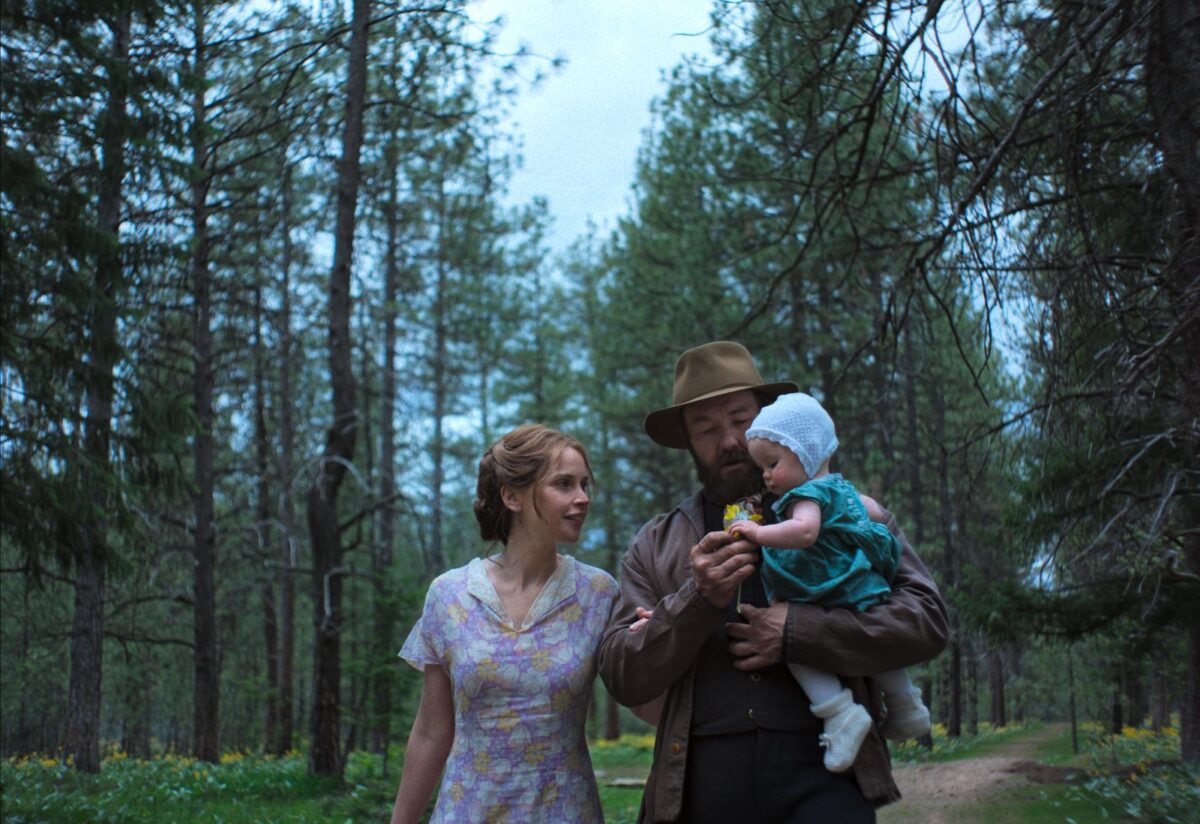
There is a moment in Train Dreams, directed by Clint Bentley, where a tree gracefully falls to the earth, surrounded by lush green. Particles explode from the impact, the sunlight illuminating these small, insignificant specs. As the frame holds for an extra few seconds, these particles gleam as beautiful as anything else in the image. It’s a powerful exclamation that underlines the larger theme of the film: there are wonders both big and small. Tragedy, too, and who will remember any of it? And, perhaps more importantly, does it matter if anybody does? – Dan M. (full review)
Jay Kelly (Noah Baumbach; Nov. 14 in theaters and Dec. 5 on Netflix)
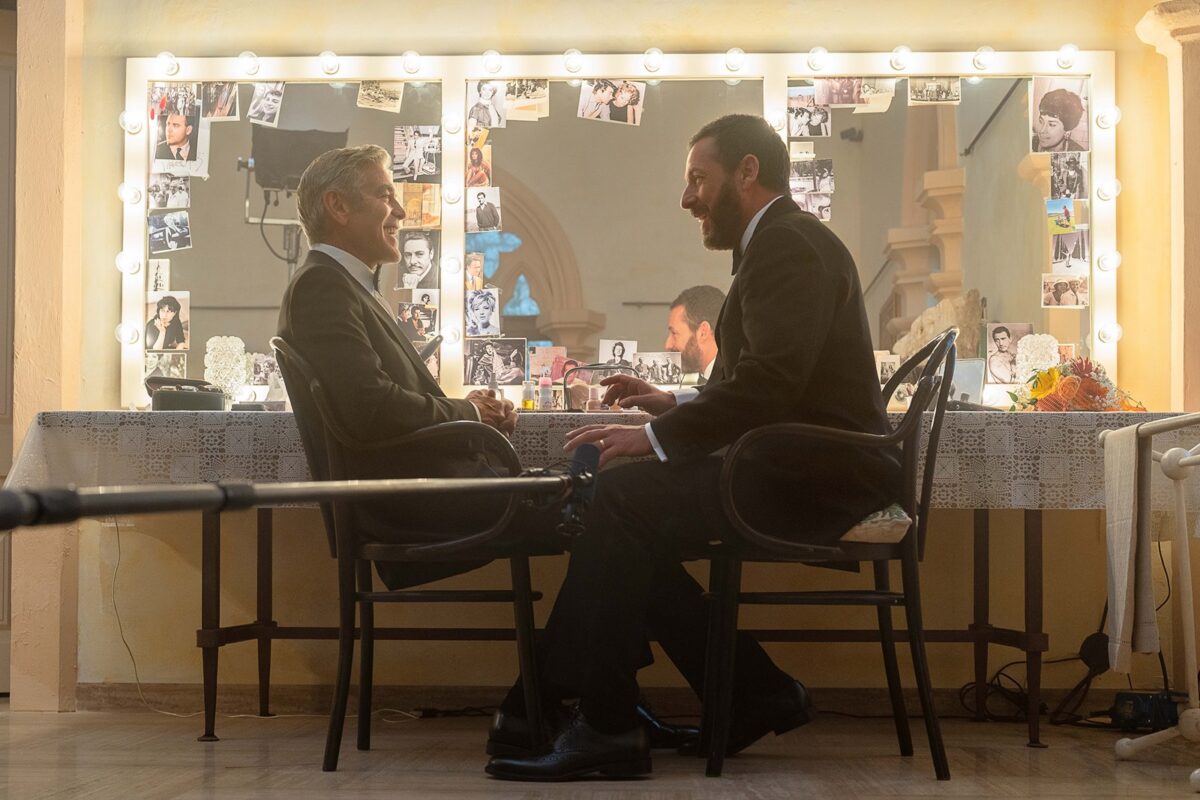
Reteaming with Netflix after his ambitious misstep White Noise, Noah Baumbach is getting introspective. Jay Kelly stars George Clooney and Adam Sandler as a movie star and his manager, respectively, as they reflect on life and their careers on a trip through Europe. With a script co-written by Baumbach and Emily Mortimer, the cast also includes Billy Crudup, Laura Dern, Grace Edwards, Stacy Keach, Riley Keough, Emily Mortimer, Patrick Wilson, Nicôle Lecky, Thaddea Graham, Jim Broadbent, Eve Hewson, Alba Rohrwacher, Lenny Henry, Josh Hamilton, and Greta Gerwig. – Jordan R.
Sirāt (Oliver Laxe; Nov. 14 qualifying run and Jan. 2026 release)
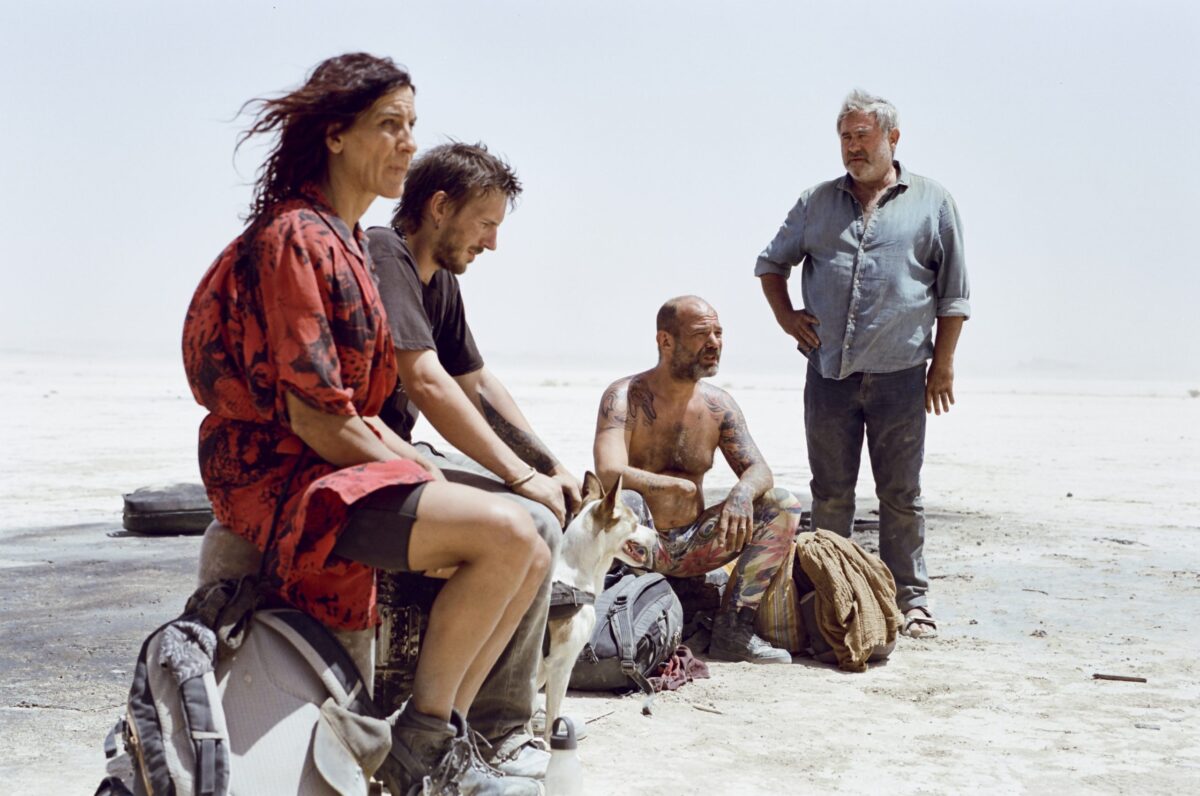
For the French-Spanish filmmaker Oliver Laxe, a competition berth in Cannes has been a long time coming. Laxe was here in 2010 (You All Are Captains), 2016 (Mimosas), and 2019 (Fire Will Come) without once going home empty-handed, and he now rises to the occasion with Sirat, his grandest, most adventurous work yet: the kind of bold, auteurist arrival that seems to happen more here than any other festival. The story takes place in Morocco, which provided the backdrop of Laxe’s first two films, and follows a father searching for his daughter amidst the dust and drugs of an illegal rave scene in and around the Atlas Mountains. There’s a delicious touch of Paul Schrader’s Hardcore to that setup, but Sirat is more in the lineage of William Friedkin’s Sorcerer, even Mad Max: a story about a ragtag group attempting to move some monstrous vehicles over a landscape so unforgiving it might actually be hell. If I see a better film in Cannes, it will have been a very good year. – Rory O. (full review)
Left-Handed Girl (Nov. 14 in theaters and Netflix on Nov. 28)
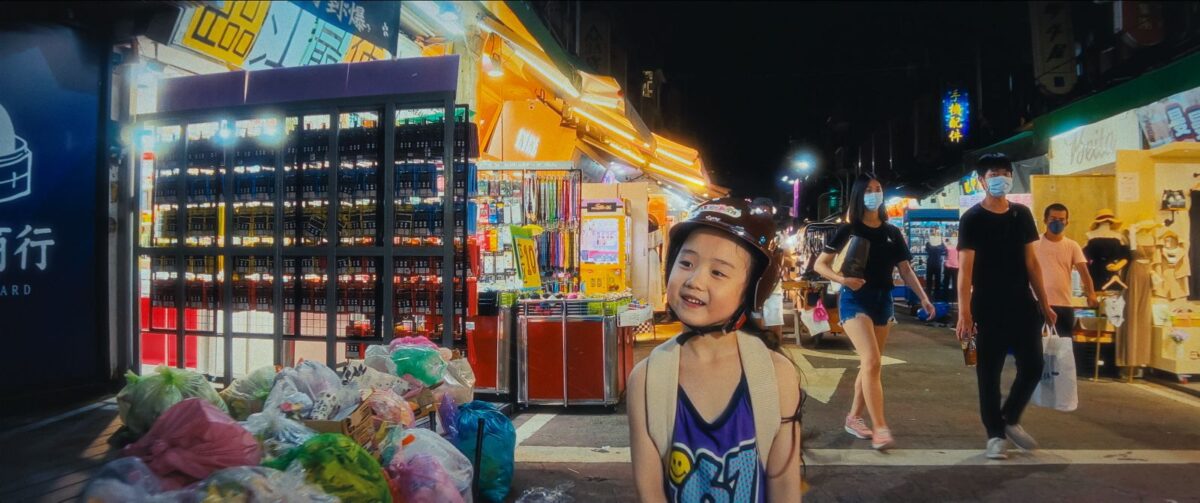
Coming off his Oscar sweep with Anora, Sean Baker returned to Cannes this year as co-writer, producer, and editor of Left-Handed Girl, the directorial debut of his long-time collaborator Shih-Ching Tsou. The film follows a single mother and her two daughters as they return to Taipei after several years of living in the countryside to open a stand at a buzzing night market. – Jordan R.
Zodiac Killer Project (Charlie Shackleton; Nov. 21)
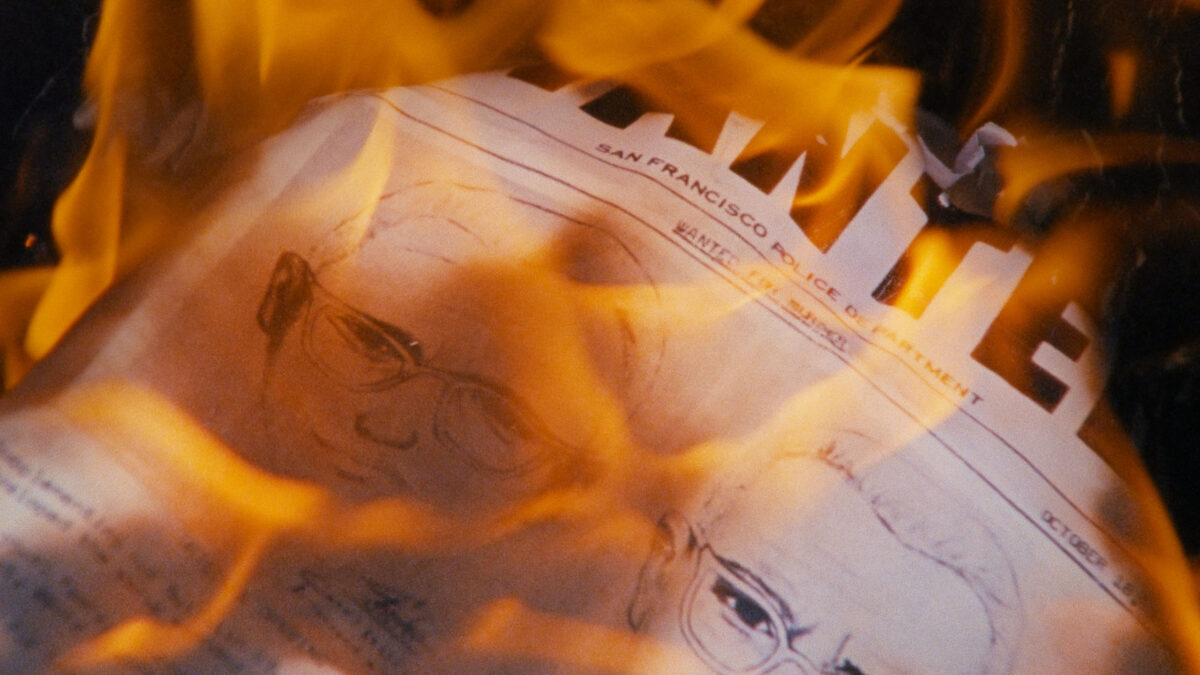
What would a feature-length director commentary look like when the film was never made? This is the slippery, fascinating conceit of Charlie Shackleton’s rather brilliant Zodiac Killer Project, which finds the director walking through his failed attempt to adapt Lyndon E. Lafferty’s book The Zodiac Killer Cover-Up: The Silenced Badge into the first major documentary on the unsolved case. What emerges, one could argue, is even more intellectually stimulating than the original intentions: a sui generis, often humorous stream-of-consciousness journey highlighting the ever-mounting mass of repeated cliches of various true-crime documentaries and series. Instead of a simple hit piece, however, Shackleton investigates why such familiarity often works on the viewer while ensuring you’ll never watch such a program the same way again. – Jordan R. (full review)
Cutting Through Rocks (Sara Khaki and Mohammadreza Eyni; Nov. 21)

An engrossing documentary portrait of a woman fighting the patriarchy in her Iranian village, Cutting Through Rocks follows the hard-fought journey of Sara Shahverdi. The first elected councilwoman in her community, she strives to upend the female societal rituals of complacency and subservience under suffocating male dominance. Whether it’s asking a class at an all-girls school to sign pledges to not surrender their young lives away to forced marriages or simply providing a sense of freedom by letting female teenagers ride her motorcycle, the film offers a detailed look at dedicating one’s life to a cause that has a million roadblocks at every step. – Jordan R.
The Secret Agent (Kleber Mendonça Filho; Nov. 26)
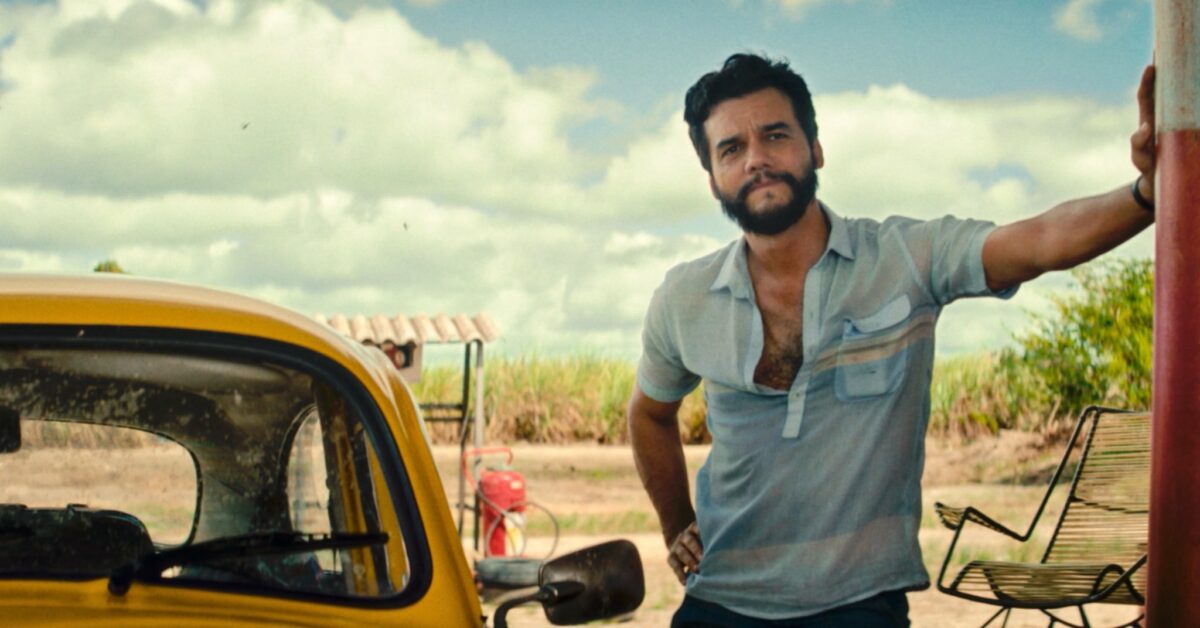
When Armando (Wagner Moura) finally resolves to seek a fake passport and one-way ticket out of Brazil for himself and his young son, he asks his father-in-law to suggest a spot where he could meet a fixer. The old man recommends a room inside his place of work: a cinema. This choice (a movie theatre standing as the only safe refuge from death) is both hopelessly romantic and in keeping with the infectious cinephilia of Kleber Mendonça Filho, director of The Secret Agent, an unsettling and rousing thriller into which Armando staggers as a tragic hero. Anyone familiar with the Brazilian’s filmography will recognize these tributes as a recurring motif, but even neophytes will appreciate the affection he reserves for the movies––those who make them and the places that house them. A critic-turned-filmmaker, Mendonça Filho is the rare cineaste who can make his love palpable and contagious. When they don’t explicitly graft their touchstones onto present-day Brazil (as the rural siege western Bacurau did with the works of John Carpenter or Sam Peckinpah) his films often double as heartfelt paeans to theatres themselves. In his recent documentary Pictures of Ghosts, the Recife-born director trained his camera on venues scattered across his native turf (or what remained), asking us to contemplate the evangelical churches and rubble that replaced them. – Leonardo G. (full review)
Hamnet (Chloé Zhao; Nov. 27)
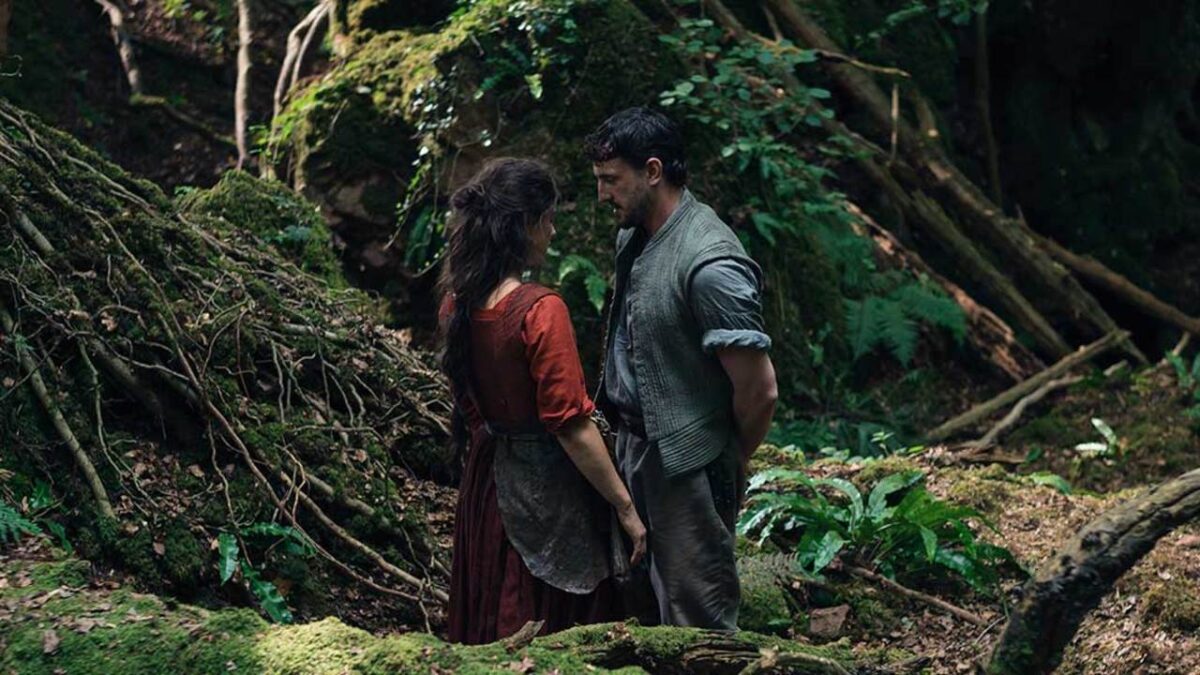
After her Marvel detour, Oscar-winning director Chloé Zhao returns to more dramatically compelling fare with a story, in fact, centered on the most famous dramatist of all time. Based on Maggie O’Farrell’s novel, Hamnet tells the fictional story of William Shakespeare (Paul Mescal) and his wife Agnes Shakespeare (Jessie Buckley) following the death of their 11-year-old son. While we hope the film returns the director to the highs of her early work, such as The Rider, we’re perhaps most compelled to see her work with cinematographer Łukasz Żal, marking his first film since The Zone of Interest. – Jordan R.
Ella McCay (James L. Brooks; Dec. 12)

In the fifteen interminably long years since James L. Brooks’ last directorial feature, the kind of adult-focused, warm dramas with recognizably emphatic characters that defined his career have sadly fallen out of fashion. After staying busy helping emerging filmmakers like Kelly Fremon Craig realize their visions with the stellar The Edge of Seventeen and Are You There God? It’s Me, Margaret, the 85-year-old director makes his overdue return this year. Ella McCay, a political comedy-drama set for a December release, stars Emma Mackey, Woody Harrelson, Kumail Nanjiani, Spike Fearn, Ayo Edebiri, Jack Lowden, Rebecca Hall, Julie Kavner, Becky Ann Baker, Joey Brooks, Albert Brooks, and Jamie Lee Curtis. – Jordan R.
Scarlet (Mamoru Hosoda; Dec. 12)

Following Belle, animation virtuoso Mamoru Hosoda is returning this fall with Scarlet, set to debut at Venice before arriving in theaters before year’s end. A fantastical riff on Hamlet, it follows a “murdered princess who awakens in a realm between life and death. Racing against time in a world of chaos, she must defeat her father’s killer and reach a mythical sanctuary before her soul vanishes forever.” – Jordan R.
Wake Up Dead Man: A Knives Out Mystery (Rian Johnson; Dec. 12 on Netflix)
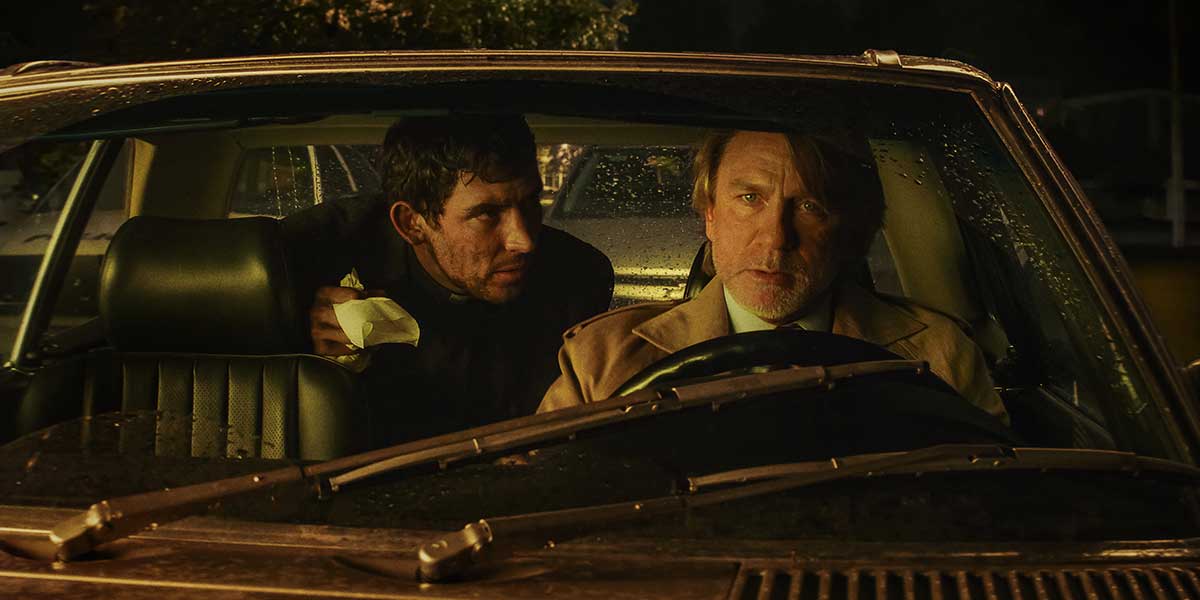
There’s not much we need to know to show up (or, sadly, simply turn on our TV) for the latest Benoit Blanc adventure. Marking the fourth Josh O’Connor film of the season, Rian Johnson has assembled quite a supporting cast for Daniel Craig’s latest detective tale, also featuring Glenn Close, Josh Brolin, Mila Kunis, Jeremy Renner, Kerry Washington, Andrew Scott, Cailee Spaeny, Daryl McCormack, and Thomas Haden Church. – Jordan R.
Avatar: Fire and Ash (James Cameron; Dec. 19)
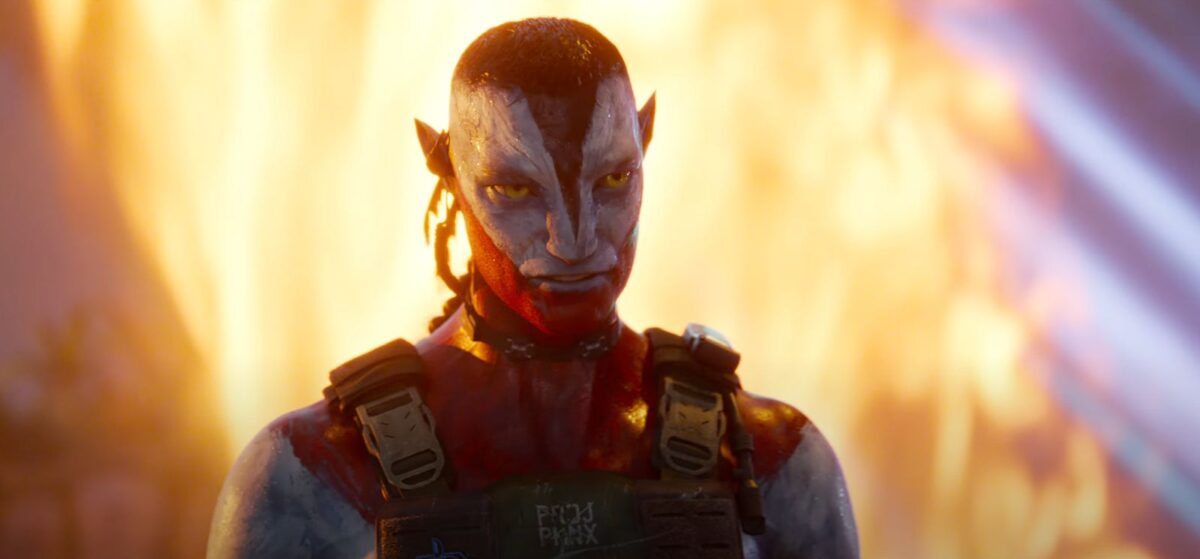
The king of the blockbuster, James Cameron, returns this winter with the latest installment of his Avatar franchise. The third feature, Avatar: Fire and Ash, finds David Thewlis and Oona Chaplin joining the ensemble of Sam Worthington, Zoe Saldaña, Sigourney Weaver, Stephen Lang, Oona Chaplin, Cliff Curtis, Britain Dalton, Trinity Bliss, Jack Champion, Bailey Bass, and Kate Winslet. After The Way of Water proved Cameron still had all of his chops (and more), here’s hoping he creates another sequel that bests its predecessor. – Jordan R.
Is This Thing On? (Bradley Cooper; Dec. 19)

Returning with his third directorial feature after shooting concluded just a handful of months ago, Bradley Cooper’s Is This Thing On? draws inspiration from the real life of British comedian John Bishop, telling the story of a stand-up (Will Arnett) as he deals with the mutual divorce from his wife (Laura Dern). Also starring Cooper alongside Andra Day, Christine Ebersole, Ciarán Hinds, Sean Hayes, Peyton Manning, and Amy Sedaris, the film will world-premiere at New York Film Festival ahead of a late December release. – Jordan R.
Marty Supreme (Josh Safdie; Dec. 25)
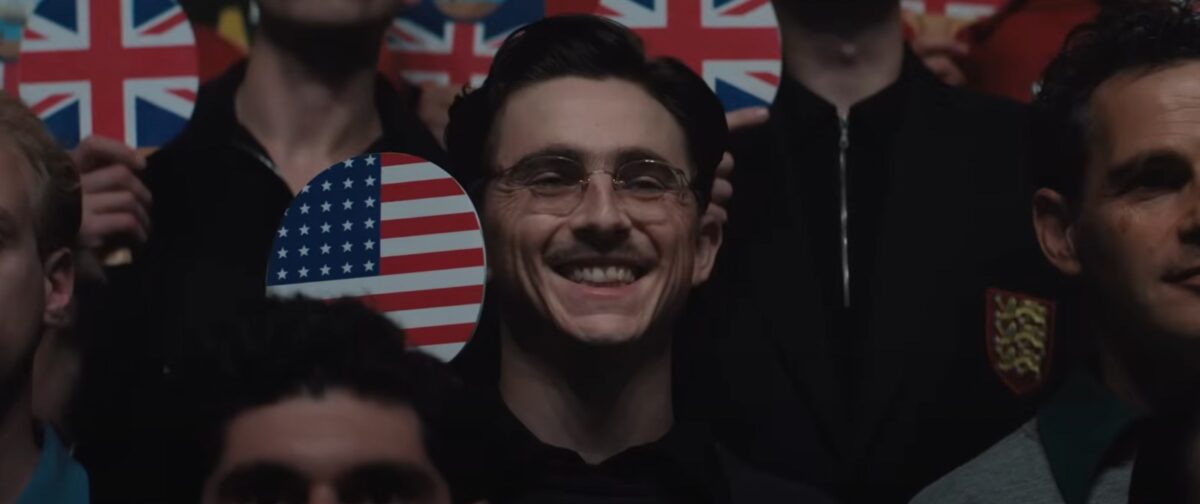
Rounding out the year is a film among our most-anticipated of the season. Six years since Uncut Gems, Josh and Benny Safdie have forged separate paths––both are set to release major, sports-centered character studies from A24 this fall. After Benny Safdie’s The Smashing Machine, Josh Safdie’s Marty Supreme will arrive this Christmas. With a cast including Timothée Chalamet, Gwyneth Paltrow, Tyler Okonma, Odessa A’zion, Penn Jillette, Kevin O’Leary, Abel Ferrara (!), Fran Drescher, Sandra Bernhard, Spenser Granese, and Philippe Petit, the film follows ping pong legend Marty Reisman, a hustler who’d regularly win off bets. His astonishing career spanned 22 major titles between 1946 and 2002, five bronze medals at the World Table Tennis Championships, and the distinction of being “the oldest player to win an open national competition in a racket sport.” – Jordan R.
More Fall Releases to See
- Sleep with Your Eyes Open (Sept. 5)
- Spinal Tap II: The End Continues (Sept. 12)
- Rabbit Trap (Sept. 12)
- Bang Bang (Sept. 12)
- The Lost Bus (Sept. 19 in theaters and Oct. 3 on Apple TV+)
- Another End (Sept. 19)
- Chain Reactions (Sept. 19)
- Play Dirty (Oct. 1 on Prime Video)
- The Alabama Solution (Oct. 3 in theaters, Oct. 10 on HBO Max)
- Orwell: 2+2=5 (Oct. 3)
- Are We Good? (Oct. 5)
- Fairy Land (Oct. 10)
- Israel Palestine on Swedish TV 1958 – 1989 (Oct. 10)
- Mistress Dispeller (Oct. 22)
- Hedda (Oct. 22 in theaters and Oct. 29 on Prime Video)
- Springsteen: Deliver Me From Nowhere (Oct. 24)
- Coexistence, My Ass! (Oct. 29)
- The Thing With Feathers (Oct. 31)
- Hallow Road (Oct. 31)
- Predator: Badlands (Nov. 7)
- Eternity (Nov. 14)
- Arco (Nov. 14)
- Come See Me in the Good Light (Nov. 14 on Apple TV+)
- Rental Family (Nov. 21)
- Cactus Pears (Nov. 21)
- La Grazia (Dec. 5)
- The Plague (Dec. 24)
- Song Sung Blue (Dec. 25)
The post 50 Films to See This Fall first appeared on The Film Stage.
from The Film Stage https://ift.tt/riNOeck


0 Comments